#story idea in my head.... the natural progression is for the main characters (hero + sidekick + villain) to end up in a throuple...
Explore tagged Tumblr posts
Text
.
#story idea in my head.... the natural progression is for the main characters (hero + sidekick + villain) to end up in a throuple...#cant even brainrot about this with my offline cishet monogamous friends....#it wasn't supposed to end up like this but then. i started expanding on the villain's character arc a bit and it just. yeah#hero/villain is wlw enemies to lovers villain/sidekick is friends to lovers and hero/sidekick is more love at first sight gahh#brainrotting....#megumi.fm
8 notes
·
View notes
Text
Ip Idea 1

Kohei Horikoshi, My Hero Academia, 2014
I think that when it comes to thinking about prejudice through the lens of a fictional world. My hero academia does a pretty good job of talking about this issue. With the rise of superpowers known as quirks, people didn't know how to handle them at first. There was a very distinct divide between those who had "heroic" and "villainous" quirks. The fear that surrounded those who were deemed as villainous usually caused the people who had such quirks to fall down this path due to miss treatment and judgement.
Later on in the series, a quirk counseling program was founded by one of the main character Ochaco Uraraka after her friend Himiko Toga (villain) died while saving her life. She founded this program to help children, like toga, who could not control their quirks, and provide them with the much needed support to learn how to embrace it and so that they would not fall through the cracks like many had before them. It is so important for children to see that their qurik no matter it's nature at first glance can be used to support them and society if applied in the correct way.
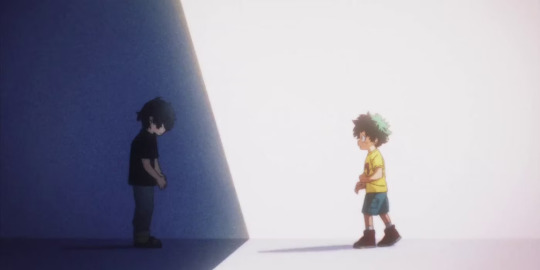
Kohei Horikoshi, My Hero Academia, 2014
By looking at the stories of Himiko Toga and Tomura Shigaraki, they had the potential to be as heroic as any of the other characters. But due to the mistreatment and being ostracized they fell down a dark path, because this is where they felt supported. They were doomed from their birth, and society did nothing to help them.
When thinking about writing my own story, I defiantly think that it would be interesting to include something similar to this. I think that its very interesting and could work for what I have in mind.
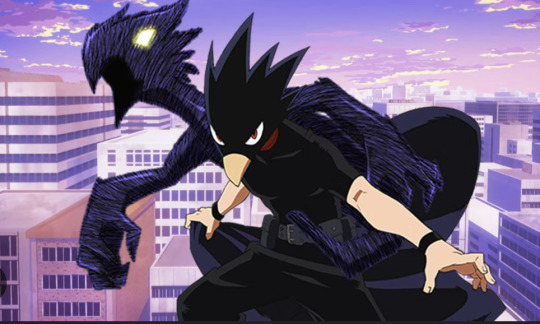
Kohei Horikoshi, My Hero Academia, 2014
There is also the aspect of the divide between non mutant and mutant quirks. While some people resemble a normal human, others in order to adjust to their quirk, take on a different appearance. For example the character Fumikage Tokoyami has the body of a human, and the head of a crow to mirror his quirk which is called dark shadow, which is a shadow figure that is in the shape of as avian like monster that he can control at will. But something that has been brought up again and again is that people who have mutation quirks can be treated as less than human due to their appearance.
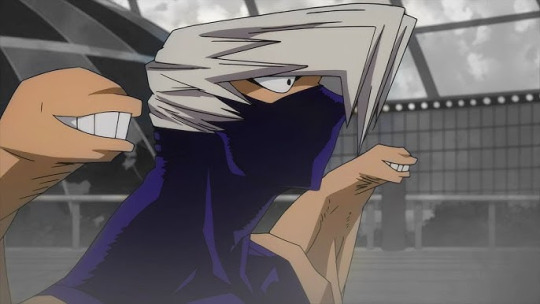
Kohei Horikoshi, My Hero Academia, 2014
The character Mezo shoji covers his face with a mask the majority of the series due to comments made about him as a child, calling him a scary monster. There have also been instances of humanoid characters calling mutant characters names that I personally feel like have to be some kind of slur. The character Hitoshi Shinsou calls the character Mashirao Ojiro "monkey" multiple times due to his tail. And the character Shoto Todoroki calls a police officer with a dog's head a "mutt." In the end of the storyline, two of the character Shoji and Kouda go on to extreme efforts prejudice towards people mutation quriks. With the rise of more "odd" quirks as time progresses, moving towards a more inclusive society is integral to keeping peace.
While My Hero Academia breaks many boundaries when it comes to thinking about prejudice when it is through the lens of fantasy. It falls extremely short in real life representation. While yes, this is an anime that takes place in Japan which is a very "monolithic" country. (not calling it that for sure, because it is a myth on its own). The show features only a handful of non Japanese POC. And the POC that do exist in the show, their backgrounds aren't really developed upon. I defiantly think that they should have included more of this, since quirks arose around the globe and not just Japan.
How can I use the fantasy elements of MHA to my advantage while pushing forward and still representing real life underrepresented people?
2 notes
·
View notes
Note
"Would you ever write": 1) a narumitsu story (doesn't need to end well *smirk* Sorry I am mean XD ) 2) an Ace Attorney/Elena of Avalor crossover 3) a Krisnix fix-it ?
Yes and No
What I mean by that is that. No, I would never write a story where narumitsu is the exclusive and only focus. I'm not even sure that I could write a Phoenix & Edgeworth gen platonic story. I'm just not invested in their dynamic enough to want to center a fanwork about it.
However, I would be open to writing a story that incorporates narumitsu provided that it isn't the main/only focus. For instance, I might write a krisnix that has past narumitsu, unrequited narumitsu, or future narumitsu, but in those cases, krisnix would still be the "main" ship and the narumitsu would stay in the background. Even if the narumitsu is "endgame," I would absolutely imply that Phoenix will always be more than a little in love with Kristoph.
I would also be open to writing Phoenix and Edgeworth as part of a poly ship with someone else. I made a post a few days ago about how the introduction of nearly any third party into the Nick & Miles dynamic is somehow able to make me care about narumitsu. I think the most likely candidates for the 3rd member of the triad would naturally be Kristoph, followed closely by Lang. But I admit to also being curious about Lana or Blackquill. So who knows where it might go.
2. Maybe
I already have way too many works-in-progress/plot bunnies for both fandoms (plus a few other fandoms) to think seriously of adding to them. So I don't think it's particularly likely that I would write an AA + EoA crossover. However, I have actually put some considerable thought into how exactly a hypothetical crossover might work. (If I ever find a way to make my blorbos from each fandom interact in a way that makes sense, this could definitely change).
In the series finale of EoA's sister show Sofia the First, we are teased with the idea of multiple-dimensions/alternate universes existing within canon. The Ever Realm (where EoA and StF take place) is specifically identified as being in a distinct universe from NeverLand and the existence of NeverLand implies the existence of London. And given that London is the setting of the both the Ace Attorney/Layton crossover and the Ace Attorney prequel, we can assume that this universe would be compatible with the wider Ace Attorney franchise.
So due to ambiguous magical shenanigans (maybe involving Esteban's teleportation staff?) , the cast of Elena of Avalor could hypothetically dimension-hop into the same universe as the Ace Attorney characters. I think a crossover might work best if it was set primarily in Kingdom of Khur'ain from Spirit of Justice. It would still be quite an adjustment but definitely less of a culture shock than having the EoA crew land in modern-day Japanifornia.
I have thought a bit as well about some of the character interactions that I would love to see.
Esteban would not get along with Minister Inga, as he would remind Esteban of the worst aspects of himself (pompous, arrogant, ambitious). Nahyuta would also remind Esteban a lot of himself, in the sense of being , once-idealistic-but-grown-more-jaded as a result of being trapped from a young age under the thumb of a very powerful, cruel, and dangerous tyrant , being forced to do terrible things as a result but nevertheless clinging to their humanity through it all and trying to use what little influence they have to protect their family and country. I really think that they could really help each other heal. I also feel like Esteban might develop a crush on Dhurke Sahdmadhi, but he absolutely would not recognize it as a crush. He would just be all "he's so tall and mysterious and manly. like a hero from a storybook. I want him to think I am cool and smart and interesting too." (This is also how I head canon that Esteban hypothetically views Antonio Agama in universe--an actual crush that he mistakes for a very long time as being a man crush/hero-worship due to him being a very closeted, very repressed and even more oblivious distinguished disaster bi.)
Athena has the potential to develop some really powerful bonds with both Esteban and Elena. Elena's emotion dress magic and Athena's emotional-hearing + Widget provide an interesting point of commonality on discussing how they feel and process emotions in themselves and others--as well as how to cope when the strength and intensity of their feelings overwhelms them. Esteban, meanwhile, would not easily be able to hide his loneliness, guilt, and insecurity from Athena's super-hearing, nor from her compassion. Hear heart would go out to him and she would work on helping him see the good in himself/build himself back up as well as reminding the other characters to show him the affection, attention, and validation that he's always needed.
I feel like Mateo and Apollo would not get along. This is probably a combination of me projecting my Mateo apathy onto Apollo and the fact that Apollo is in general fairly prickly, hot-tempered, and judgy. They would squabble and I would live for it.
Klavier would absolutely flirt shamelessly with everyone. Gabe and Esteban just roll their eyes and Mateo and Elena would be oblivious. But Naomi...he would absolutely rub Naomi up the wrong way and she would bond with Ema over it. She eventually comes around to him, especially when he turns down the playboy persona and is a bit more genuine. I also feel pretty sure that Klavier and Prince Alonzo would start out as bitter rivals, abruptly become besties, and then maybe something more?
Ema and Isabel would absolutely talk each other's ears off about science, and thanks to Ema, Isa would probably enter her "forensics" era for awhile and spend a lot of time using science to play detective.
I feel like Trucy might exchange sleight-of-hand tricks with the Delgados. She would also be fascinated by Elena's scepter and Esteban's staff and would spend a lot of time trying to figure out how the "trick" worked.
Haven't really thought much about Phoenix, the Feys, Edgeworth, Larry, Blackquill, Ziska, Gumshoe, or any of the others. But I think there's potential there. Maybe particularly in having Maya or Pearl channel Alacazar as well as Elena's and/or Esteban's parents.
3. Yes. Yes. Yes.
I actually have a few plot bunnies/works-in-progress (albeit very much on the backburner) that have elements of "krisnix fix-it-fic."
One of them is a post-canon, angsty mess but that ultimately will have elements of getting back together and Kristoph receiving mental health care.
Another is a Crazy Ex-Girlfriend AU in which madcap screwball romantic dark comedy shenanigans ensure that Kristoph never actually kills anyone, undoes a lot of the damage he's already done/takes accountability for his actions, and ends up with a relatively happy ending (even if I'm not entirely sure whether he'd end up with Phoenix ,alone or with one of the alternate love interests.)
The third is a time-travel AU scenario. The DLC case of SOJ supposedly includes elements of time-travel but are later revealed to be faked/misinterpretations. This fic would presuppose that in the process of investigating the case, Phoenix discovered that time travel really does exist. In exchange for successfully convincing everyone else that it doesn't, the Time Travel Bureau will allow Phoenix to make a few changes to the past, provided that they don't disrupt the wider timeline too much. After his first choices of saving Mia and Gregory Edgeworth are rejected (as their deaths have too great an impact on events), Phoenix is permitted to "save" Kristoph by preventing him from committing the murders (as it's gauged that Zak and Drew Misham would've died of natural causes soon afterwards anyway). Phoenix has to be *very* careful in terms of not letting anyone know what he is doing and only making the slightest changes. He will still lose his badge and spend 7 years without it, Zak will still abandon Trucy, Kristoph's forgery will still be revealed and he'll be disbarred and sent to prison for it--though fortunately he doesn't have murder on his conscience/sentence. But Kristoph will eventually get out on parole, live a much happier life (I'm thinking he ends up working in the marketing department for Ariadoney), and possibly get back together with Phoenix.
Send me an ask that says “Would you ever write…” and continue the sentence. I’ll respond with yes or no and give an explanation as to why if I want to.
4 notes
·
View notes
Text
'“Meryl Streep, who’s a great hero of mine, says, ‘Take your broken heart and turn it into art.’ There’s something really beautiful about how you can have something deeply painful and shameful even, and in revealing of that, you can do something that makes other people feel seen and feel better, like their hand is being held through the screen,” says All of Us Strangers star Andrew Scott. “In order to do that, you’ve got to show yourself. You’ve got to be unadorned and you’ve got to try not to act. In a way, playing Adam was a challenge, but in another way, it felt so wonderful because I felt so seen by what Andrew had created in the screenplay.”
Scott, speaking with writer/director Andrew Haigh (Weekend) to a group of journalists during a virtual press conference, gives the performance of a lifetime in All of Us Strangers. The film is a deeply moving consideration of queerness and love both romantic and familial. Scott stars as Adam, a screenwriter who revisits the ghosts of his past—his parents—while penning a new script. At the same time, he begins a passionate relationship with his neighbour, Harry (Paul Mescal), in his empty apartment building. The two haunting yet affecting storylines illustrate Scott’s point about pain and art. There’s something profoundly therapeutic about sharing loss through storytelling in a way that allows others to heal.
For Haigh, the chance to explore this ghost story in which Adam repairs things unsaid with his late parents was part of the appeal of adapting the novel Strangers by Japanese author Taichi Yamada. “There was something in that original novel that I could not get out of my head, which was this idea about meeting your parents again long after they are no longer in your life,” observes Haigh. “That conceit was fascinating to me as a way to explore family, to explore love, to explore the pain from our past.”
Where the novel follows a traditional ghost story, Haigh filters the adaptation through his experience. As Adam finds closure with his parents, his conversations include a revelatory coming out scene with his mother (Claire Foy) in which he takes pride in sharing the progress for gay rights that have been achieved since her passing. Back home, Adam finds an ability to express love with Harry in ways that he hadn’t been able to before with a man. Moreover, Harry’s presence illustrates the subtle ingenuity of Haigh’s adaptation. In the novel, Adam begins a relationship with a melancholy woman. In the film, Haigh takes the themes to new heights as the elder Adam’s care for the younger Harry invites readings of the AIDS crisis and all the people who died alone when the world forgot to love.
“I am gay myself, so it made sense to change the sexuality of the main character. I also wanted to tell a story about family and its relationship to queerness and how, as a queer kid, it can be very different growing up within essentially a heterosexual family,” explains Haigh. “Turning the sexuality made a big difference, I think, to the story as a whole. In many ways, the story is about understanding the nature of love. It’s about how romantic love is associated with familial love and how connected and intertwined they are. Doing that felt like the perfect way to explore that element of the story.”
Haigh explores these elements quite powerfully in the scenes with Adam’s parents. The film refreshingly treats the parents empathetically while rejecting the conventional coming out narrative that often put the emotional weight on the parents. Rather, Haigh serves love in equal doses for the mother (Claire Foy) and father (Jamie Bell) who never got to see their son grow old.
“I think that what I learned about myself as a parent is that I never want to leave anything unsaid,” adds Foy. “What this film teaches you is that life is too short to not say what you want to say, even if it hurts someone’s feelings. Even if you feel like you might not be heard, either you’ve said it or you’ve offered someone something—you’ve given someone else an opportunity in life to think about things differently or hear you. I think the most painful thing that can happen is that you don’t get heard.” All of Us Strangers further explores these intimate family dynamics by setting the story in Haigh’s childhood home, which adds a touching personal element to the intimate space that Haigh creates for this fictional family.
Scott, who is also gay, recognizes the personal interplay between life and art with which Haigh crafts Adam’s character. Scott’s performance appropriately carries the depth and nuance that arises when an actor truly knows what it feels like to embody his character’s skin. Scott says that he deliberately avoided reading the book in order to stay true to the experience of Haigh’s character. “Our initial conversations were about not acting, so to speak,” says Scott. “It would’ve felt a little perverse to create a character who was too far away from Andrew’s experience of growing up and my experience might’ve been grown up.”
While Scott almost grows more youthful in the presence of Bell and Foy—fun changes in Adam’s costuming, including old pyjamas, make him seem more childlike—he really makes the character his own in his scenes with Mescal. Whereas Yamada’s protagonist is haunted by the past in the present, Adam grows through Harry’s touch. The closure he gains with his parents affords him confidence to explore love more confidently.
“What I think is so beautiful is that once he begins to be loved by his parents, he is able to step out of that purgatory and start to love somebody else,” observes Scott. “I think that’s a real experience for so many people. You go, ‘I don’t have to worry about that anymore because I’m being literally embraced.’ So much of the film is tactile and tender. There’s so much physical touch in there.”
Haigh accentuates this tenderness as the camera lingers on Scott and Mescal in the afterglow of morning following long nights in bed spent making love and sharing their experiences. The film’s final twist, one of bittersweet tragedy, underscores the weight of things said and unsaid. For Haigh, the complexity of this intimacy involves considering the elements of Yamada’s novel that create the ghost story. All of Us Strangers dials back the supernatural elements, yet creates something profound by affording Adam an idyllic fantasy in which he’s loved for who he is. “I could lean into the ghost elements of it, the supernatural element, but that didn’t feel totally right,” admits Haigh. “I’m trying to traverse different worlds, essentially his world in the present and this world of the parents too. I tried to concentrate on the emotional truth of what Adam is needing or wanting in this moment.”
Scott agrees and notes that he could relate to the experience of finding catharsis by imagining love. “I just immediately recognised it as something that I feel, which is the accidental cruelty of families. Through love, we say things to our families that are brutalising and make your family members feel unseen and you feel angry with them,” he says. “Working through that is so beautiful because, for a lot of people in Adam’s situation, when they come out, it’s not about necessarily outright rejection, nor is it about full-hearted embracing. It’s somewhere in between. I think that’s an experience for a lot of gay people, queer people, and people in the LGBTQ+ community.”
What makes All of Us Strangers a new landmark for queer cinema is the continuity of love through tough conversations. Haigh hopes that audiences find this element of the story cathartic—and he sees something of himself in Adam’s own creative process. “The fact that Adam gets to have those conversations with his parents is so powerful,” says Haigh. “I’ve managed to have conversations with my parents through making the film. Even if I don’t actually have those conversations for real with my parents, I’ve now had them, somehow, and that’s quite powerful.”'
#Andrew Haigh#Andrew Scott#Meryl Streep#All of Us Strangers#Paul Mescal#Strangers#Taichi Yamada#LGBTQ+#Claire Foy#Jamie Bell
2 notes
·
View notes
Text
Ip Idea 1 (I accidentally deleted this one)

Kohei Horikoshi, My Hero Academia, 2014
I think that when it comes to thinking about prejudice through the lens of a fictional world. My hero academia does a pretty good job of talking about this issue. With the rise of superpowers known as quirks, people didn't know how to handle them at first. There was a very distinct divide between those who had "heroic" and "villainous" quirks. The fear that surrounded those who were deemed as villainous usually caused the people who had such quirks to fall down this path due to miss treatment and judgement.
Later on in the series, a quirk counseling program was founded by one of the main character Ochaco Uraraka after her friend Himiko Toga (villain) died while saving her life. She founded this program to help children, like toga, who could not control their quirks, and provide them with the much needed support to learn how to embrace it and so that they would not fall through the cracks like many had before them. It is so important for children to see that their qurik no matter it's nature at first glance can be used to support them and society if applied in the correct way.

Kohei Horikoshi, My Hero Academia, 2014
By looking at the stories of Himiko Toga and Tomura Shigaraki, they had the potential to be as heroic as any of the other characters. But due to the mistreatment and being ostracized they fell down a dark path, because this is where they felt supported. They were doomed from their birth, and society did nothing to help them.
When thinking about writing my own story, I defiantly think that it would be interesting to include something similar to this. I think that its very interesting and could work for what I have in mind.

Kohei Horikoshi, My Hero Academia, 2014
There is also the aspect of the divide between non mutant and mutant quirks. While some people resemble a normal human, others in order to adjust to their quirk, take on a different appearance. For example the character Fumikage Tokoyami has the body of a human, and the head of a crow to mirror his quirk which is called dark shadow, which is a shadow figure that is in the shape of as avian like monster that he can control at will. But something that has been brought up again and again is that people who have mutation quirks can be treated as less than human due to their appearance.

Kohei Horikoshi, My Hero Academia, 2014
The character Mezo shoji covers his face with a mask the majority of the series due to comments made about him as a child, calling him a scary monster. There have also been instances of humanoid characters calling mutant characters names that I personally feel like have to be some kind of slur. The character Hitoshi Shinsou calls the character Mashirao Ojiro "monkey" multiple times due to his tail. And the character Shoto Todoroki calls a police officer with a dog's head a "mutt." In the end of the storyline, two of the character Shoji and Kouda go on to extreme efforts prejudice towards people mutation quriks. With the rise of more "odd" quirks as time progresses, moving towards a more inclusive society is integral to keeping peace.
While My Hero Academia breaks many boundaries when it comes to thinking about prejudice when it is through the lens of fantasy. It falls extremely short in real life representation. While yes, this is an anime that takes place in Japan which is a very "monolithic" country. (not calling it that for sure, because it is a myth on its own). The show features only a handful of non Japanese POC. And the POC that do exist in the show, their backgrounds aren't really developed upon. I defiantly think that they should have included more of this, since quirks arose around the globe and not just Japan.
How can I use the fantasy elements of MHA to my advantage while pushing forward and still representing real life underrepresented people?
0 notes
Text



Musings on Legacy, Journey and Purpose:
The last few months have been full of internal strife for me as I’ve felt significantly more introspective than usual. I’ve felt insecure about my standing in life, worried if this dream is unrealistic due to the obstacles that seem to keep preventing me from reaching higher levels of audience for my art; I’ve been in my head about my own self worth as a result. Making art, my jewelry, is the sole thing I am tangibly talented at in this life, and for that reason I’ve always understood it as my ikigai, the culmination of my passion, expression, purpose, and reason for existence. To be vulnerable, I’ve questioned all of this the last few months heavily, and the last year in general.
When I think about my life path and purpose, I see that it’s been challenging terrain to navigate. I’ve had many roadblocks, struggles, I’ve been mired in the repercussions of my mistakes and circumstances many times, but I’ve always been introspective in nature and it’s allowed me to adapt and change myself on an ever-evolving basis, for the better (in my own judgement, admittedly). I refer to my life story as ‘The Hero’s Journey’, akin to the ones told and retold in myth over millennia. The hero- imperfect, flawed, maybe brimming with mistakes, error, and pain, seeking redemption, undergoes a symbolic journey to the underworld through trials such as Heracles, and has to lose almost every single thing in order to facilitate their growth, to trudge through the trials and from their difficulty, emerge fully transformed and purified, alchemized, at the end of the journey. To prevent mischaracterization, I don’t view myself as anyone elevated in any status akin to what society deems a “hero”, I more so think this trope applies to me in the sense that I am the main character of my own life as the architect and author of it, experiencing my life and humanity through the lens of my own consciousness, therefore I am the protagonist of my own story. I’m still undergoing my journey, I’ve had dark nights of the soul and I’ve made it through the other side on more than one occasion. This ever questioning introspection is another trial to me, despite the journey being one of inward motion into my own psyche, questioning my self-testament and what I’ve perceived to be my truth these 30 years.
At this point in time, I’m in my Saturn return. For those uninitiated or unaware, it’s a time where your natal Saturn placement returns to where it was when you came into this world; this happens around age 30, and whatever house it is located in your birth chart will give you more information regarding the themes and events that may occur around that time. Saturn returns are an initiation into full adulthood and autonomy, with it bringing consistent themes of responsibility, discipline and dedication, structure and purpose, ideas of rest and reward, realism and restriction. I’ve made it through the exact conjunction, and I will continue to explore these themes until Saturn enters Aries next year. This momentous life event is one everyone who reaches this age will go through, I count myself as blessed to be amongst those who have traversed the hardships and lessons of autonomy and responsibility, initiated into this planetary energy. At the time of writing, I near my solar return, my birthday, and I feel a mixture of pride over how much progress has been made on this hero’s journey, but also hesitancy and fear over what the next years of life will entail. To be transparent, this fear and insecurity on the material plane has been playing into the cycles of introspection and the subsequent crisis of faith I’ve undergone with myself. My Saturn is placed in my first house of self, and I’ve consistently struggled with listening to my innermost self knowledge of *who I am* over what those around me tell me I am; I’ve been forced to learn discernment, to be responsible with my energy and how much I dedicate to others and external sources of understanding and validation. This directly ties into what I’ve been struggling with in my inner world and what has seemingly reached a culmination of in recent months: my purpose, my own sense of fulfillment and validation, feeling as if my life and purpose have value in this world.
A labor of my hero’s journey has included fully stepping into adulthood, as the last representative bastion of my childhood and all I knew of the world previously, my childhood home, has been sold, a turn of page from the past onto a future, unwritten. I’ve now lost my grandmother who embodied my childhood and youth, was the guardian of my early life, as well as her home that sheltered us. As I’ve been struggling with these internal narratives, I’ve been finding myself interacting in the dream world with my recently passed Mamaw on a very frequent basis, perhaps a manifestation of my stress and uncertainty has materialized as my psyche forming scenes familiar and comforting. Scenes from my childhood play out with me in the starring role, some scenes and memories are exactly as I recall them to be, others are changed and vary as if from an alternate timeline. Mostly, my grandmother stands or sits silently, almost more of a member of the audience watching the play that is my dream rather than being in a main role. On the rare occasion she emerges from her watchful state, she will sometimes speak as if remembering her lines suddenly. These dreams have been both very comforting and strange, as it means a lot to have her presence to soothe my still grieving heart and mind, but also baffling because I can’t always understand what aspects of my psyche are being explored in this dreamscape and what I should take away from these nocturnal plays.
I’m holding my still raw and still processing grief near, along with trying to explore and understand myself and my purpose better; overall its culminated to a more disconnected time for me, I feel grotesque and raw and writhing, molting, and as such I’ve just wanted to hold everything within myself and my journal and escape from the hard realities and truths of the world around me. In my vulnerability, I’ve sought out protection in its highest forms, often calling on my grandmother to guide and protect me while I’m in this transformative phase of life. Through this inward journey, I’ve been ruminating on the conscious desire to channel my grief through memories of my grandmother, to channel my understanding of legacy and protection into something tangible, material and corporeal.
From this rumination and journey inward has emerged this small Summer Collection of jewels. Apotropaic eye talismans of Pearl and gemstone, channeling the milky, opaline qualities of the lunar energy of the season of my birth; drawing upon the archetype of the mother that exists within astrological Cancer, referencing my grandmother and her legacy and her protective presence. Jewels rendered in protective shades of gray and black, gray referencing memories of watching mourning doves feast upon seed and suet in the backyard of my childhood home, my Mamaw and I both loved them and loved the moments of peace held while viewing the scene. Jewels in opaline white and black, like the velveteen sky of midnight in midwinter, the moon impossibly full and bright, held so close to earths orbit that she illuminated the solemn white world underneath. I recall this memory with fondness as Mamaw always instilled in me to appreciate nature, I took on her habits in this way. The last additions, jewels to honor transformation into highest self, the magicians stone Labradorite and milky white onyx stars to guide and channel ‘The Star’ tarot energy, energy I hope to embody as I follow this journey of finding my way back to purpose, a guiding light along the dark and winding path.
The collection can be viewed here: https://wyther.etsy.com
0 notes
Text
Story Structures for your Next WIP
hello, hello. this post will be mostly for my notes. this is something I need in to be reminded of for my business, but it can also be very useful and beneficial for you guys as well.
everything in life has structure and storytelling is no different, so let’s dive right in :)
First off let’s just review what a story structure is :
a story is the backbone of the story, the skeleton if you will. It hold the entire story together.
the structure in which you choose your story will effectively determine how you create drama and depending on the structure you choose it should help you align your story and sequence it with the conflict, climax, and resolution.
1. Freytag's Pyramid
this first story structure i will be talking about was named after 19th century German novelist and playwright.
it is a five point structure that is based off classical Greek tragedies such as Sophocles, Aeschylus and Euripedes.
Freytag's Pyramid structure consists of:
Introduction: the status quo has been established and an inciting incident occurs.
Rise or rising action: the protagonist will search and try to achieve their goal, heightening the stakes,
Climax: the protagonist can no longer go back, the point of no return if you will.
Return or fall: after the climax of the story, tension builds and the story inevitably heads towards...
Catastrophe: the main character has reached their lowest point and their greatest fears have come into fruition.
this structure is used less and less nowadays in modern storytelling mainly due to readers lack of appetite for tragic narratives.
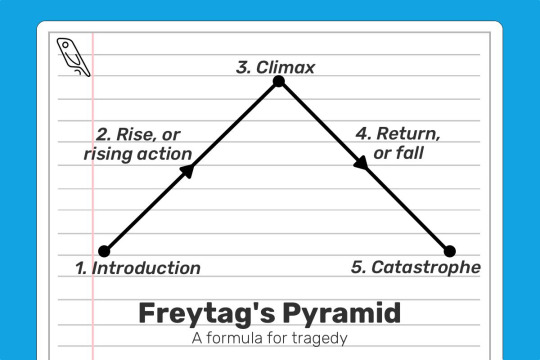
2. The Hero's Journey
the hero's journey is a very well known and popular form of storytelling.
it is very popular in modern stories such as Star Wars, and movies in the MCU.
although the hero's journey was inspired by Joseph Campbell's concept, a Disney executive Christopher Vogler has created a simplified version:
The Ordinary World: The hero's everyday routine and life is established.
The Call of Adventure: the inciting incident.
Refusal of the Call: the hero / protagonist is hesitant or reluctant to take on the challenges.
Meeting the Mentor: the hero meets someone who will help them and prepare them for the dangers ahead.
Crossing the First Threshold: first steps out of the comfort zone are taken.
Tests, Allie, Enemies: new challenges occur, and maybe new friends or enemies.
Approach to the Inmost Cave: hero approaches goal.
The Ordeal: the hero faces their biggest challenge.
Reward (Seizing the Sword): the hero manages to get ahold of what they were after.
The Road Back: they realize that their goal was not the final hurdle, but may have actually caused a bigger problem than before.
Resurrection: a final challenge, testing them on everything they've learned.
Return with the Elixir: after succeeding they return to their old life.
the hero's journey can be applied to any genre of fiction.

3. Three Act Structure:
this structure splits the story into the 'beginning, middle and end' but with in-depth components for each act.
Act 1: Setup:
exposition: the status quo or the ordinary life is established.
inciting incident: an event sets the whole story into motion.
plot point one: the main character decided to take on the challenge head on and she crosses the threshold and the story is now progressing forward.
Act 2: Confrontation:
rising action: the stakes are clearer and the hero has started to become familiar with the new world and begins to encounter enemies, allies and tests.
midpoint: an event that derails the protagonists mission.
plot point two: the hero is tested and fails, and begins to doubt themselves.
Act 3: Resolution:
pre-climax: the hero must chose between acting or failing.
climax: they fights against the antagonist or danger one last time, but will they succeed?
Denouement: loose ends are tied up and the reader discovers the consequences of the climax, and return to ordinary life.
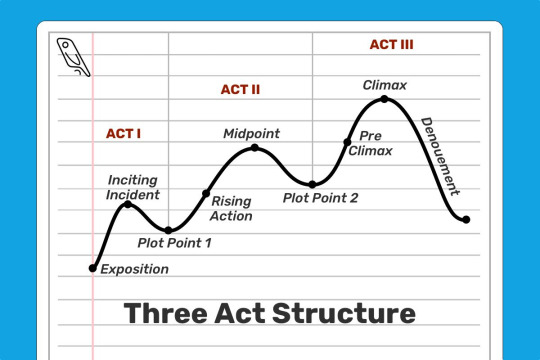
4. Dan Harmon's Story Circle
it surprised me to know the creator of Rick and Morty had their own variation of Campbell's hero's journey.
the benefit of Harmon's approach is that is focuses on the main character's arc.
it makes sense that he has such a successful structure, after all the show has multiple seasons, five or six seasons? i don't know not a fan of the show.
the character is in their comfort zone: also known as the status quo or ordinary life.
they want something: this is a longing and it can be brought forth by an inciting incident.
the character enters and unfamiliar situation: they must take action and do something new to pursue what they want.
adapt to it: of course there are challenges, there is struggle and begin to succeed.
they get what they want: often a false victory.
a heavy price is paid: a realization of what they wanted isn't what they needed.
back to the good old ways: they return to their familiar situation yet with a new truth.
having changed: was it for the better or worse?
i might actually make a operate post going more in depth about dan harmon's story circle.
5. Fichtean Curve:
the fichtean curve places the main character in a series of obstacles in order to achieve their goal.
this structure encourages writers to write a story packed with tension and mini-crises to keep the reader engaged.
The Rising Action
the story must start with an inciting indecent.
then a series of crisis arise.
there are often four crises.
2. The Climax:
3. Falling Action
this type of story telling structure goes very well with flash-back structured story as well as in theatre.
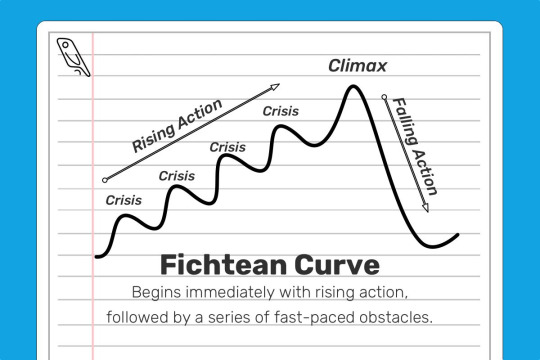
6. Save the Cat Beat Sheet:
this is another variation of a three act structure created by screenwriter Blake Snyder, and is praised widely by champion storytellers.
Structure for Save the Cat is as follows: (the numbers in the brackets are for the number of pages required, assuming you're writing a 110 page screenplay)
Opening Image [1]: The first shot of the film. If you’re starting a novel, this would be an opening paragraph or scene that sucks readers into the world of your story.
Set-up [1-10]. Establishing the ‘ordinary world’ of your protagonist. What does he want? What is he missing out on?
Theme Stated [5]. During the setup, hint at what your story is really about — the truth that your protagonist will discover by the end.
Catalyst [12]. The inciting incident!
Debate [12-25]. The hero refuses the call to adventure. He tries to avoid the conflict before they are forced into action.
Break into Two [25]. The protagonist makes an active choice and the journey begins in earnest.
B Story [30]. A subplot kicks in. Often romantic in nature, the protagonist’s subplot should serve to highlight the theme.
The Promise of the Premise [30-55]. Often called the ‘fun and games’ stage, this is usually a highly entertaining section where the writer delivers the goods. If you promised an exciting detective story, we’d see the detective in action. If you promised a goofy story of people falling in love, let’s go on some charmingly awkward dates.
Midpoint [55]. A plot twist occurs that ups the stakes and makes the hero’s goal harder to achieve — or makes them focus on a new, more important goal.
Bad Guys Close In [55-75]. The tension ratchets up. The hero’s obstacles become greater, his plan falls apart, and he is on the back foot.
All is Lost [75]. The hero hits rock bottom. He loses everything he’s gained so far, and things are looking bleak. The hero is overpowered by the villain; a mentor dies; our lovebirds have an argument and break up.
Dark Night of the Soul [75-85-ish]. Having just lost everything, the hero shambles around the city in a minor-key musical montage before discovering some “new information” that reveals exactly what he needs to do if he wants to take another crack at success. (This new information is often delivered through the B-Story)
Break into Three [85]. Armed with this new information, our protagonist decides to try once more!
Finale [85-110]. The hero confronts the antagonist or whatever the source of the primary conflict is. The truth that eluded him at the start of the story (established in step three and accentuated by the B Story) is now clear, allowing him to resolve their story.
Final Image [110]. A final moment or scene that crystallizes how the character has changed. It’s a reflection, in some way, of the opening image.
(all information regarding the save the cat beat sheet was copy and pasted directly from reedsy!)
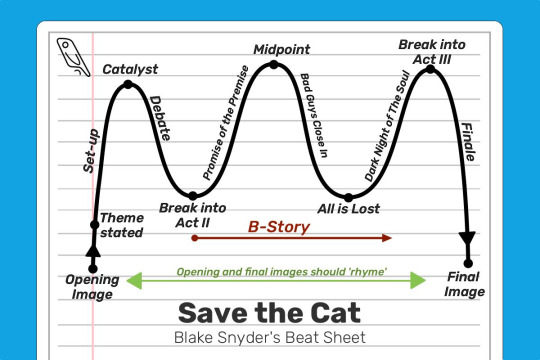
7. Seven Point Story Structure:
this structure encourages writers to start with the at the end, with the resolution, and work their way back to the starting point.
this structure is about dramatic changes from beginning to end
The Hook. Draw readers in by explaining the protagonist’s current situation. Their state of being at the beginning of the novel should be in direct contrast to what it will be at the end of the novel.
Plot Point 1. Whether it’s a person, an idea, an inciting incident, or something else — there should be a "Call to Adventure" of sorts that sets the narrative and character development in motion.
Pinch Point 1. Things can’t be all sunshine and roses for your protagonist. Something should go wrong here that applies pressure to the main character, forcing them to step up and solve the problem.
Midpoint. A “Turning Point” wherein the main character changes from a passive force to an active force in the story. Whatever the narrative’s main conflict is, the protagonist decides to start meeting it head-on.
Pinch Point 2. The second pinch point involves another blow to the protagonist — things go even more awry than they did during the first pinch point. This might involve the passing of a mentor, the failure of a plan, the reveal of a traitor, etc.
Plot Point 2. After the calamity of Pinch Point 2, the protagonist learns that they’ve actually had the key to solving the conflict the whole time.
Resolution. The story’s primary conflict is resolved — and the character goes through the final bit of development necessary to transform them from who they were at the start of the novel.
(all information regarding the seven point story structure was copy and pasted directly from reedsy!)
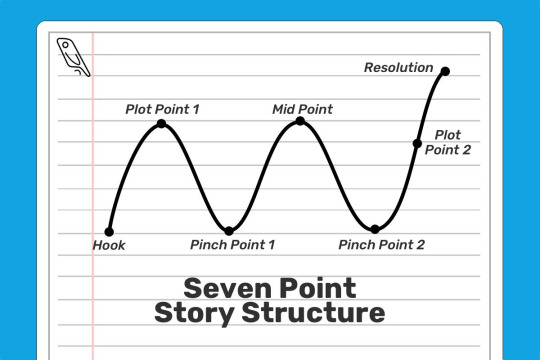
i decided to fit all of them in one post instead of making it a two part post.
i hope you all enjoy this post and feel free to comment or reblog which structure you use the most, or if you have your own you prefer to use! please share with me!
if you find this useful feel free to reblog on instagram and tag me at perpetualstories
Follow my tumblr and instagram for more writing and grammar tips and more!
#writing#writing advice#writing tips#original writing#writers on tumblr#writerscommunity#writersconnection#writersofig#writersofinstagram#writings
13K notes
·
View notes
Text
Planning Using the Three-Act Structure: Dystopian Novels
This is the third in a series of posts about the Three-Act structure, written by guest blogger Annabeth Lynch. Part 1: Romance Novels. Part 2: Mystery Novels.
It’s time for another crash course in writing! This time, we’ll be discussing the outline of a dystopian book. Ernest Hemingway gave my favorite description of being an author: “There is nothing to writing. All you do is sit down at a typewriter and bleed.” So set up that typewriter and let’s start bleeding.
Before we begin breaking down this structure as it applies specifically to dystopian stories, a little background on the three-act structure. I’ve written about this structure as it applies to romance and mystery. Most Western novels are written with this structure, which is separated into three sections. First, the beginning, aptly named the Setup, is the first 25% of the story. The second act is called the Confrontation, taking up half the story, 25%-75%. The last quarter of the story, from 75% to 100%, is the Resolution. This is the novel in its most basic form. It’s a good measure of how the story needs to progress, but there’s a lot of wiggle room in such a broad system. Also, what should happen in each of these sections varies by genre, hence this series of posts. This time, we’re going to break down the acts into plot points and show approximately which events should go in each section when you’re writing a dystopian story.
Dystopian novels usually clock in at 60,000 to 120,000 words, so we’ll base the word count on the average, which is 90,000. Though dystopian novels are often turned into series, for simplicity’s sake we’ll work with the idea that this novel is a stand-alone. This same structure can be used on a larger scale for a series if desired, though - just recalculate the word counts appropriately.
The Setup
This act is about laying the foundation of the novel. This is where your hook should be, right at the beginning. Additionally, the reader should get a glimpse of the main character(s) in their average life and develop a baseline understanding of how the world works. In a dystopian novel, some aspect of society or the world is exaggerated and therefore causing problems for the characters. The main two causes of a dystopia are a man-made disaster or a natural disaster or descent of society. Readers will want to know what caused your specific dystopia to come about and how these events have affected the populous.
At the 12% mark (approximately 10,800 words in), the inciting incident should occur. After the world is established in the reader’s head, it’s time to introduce the crux of the plot. In dystopian books, because this subgenre can be used in multiple larger genres (like sci-fi or fantasy) there’s a lot of room to work with different types of stories you can tell. Regardless of which direction you choose to write in, the inciting incident should affect all the main characters and function as a call to action that they will undoubtedly rise to - whether because they want to incite change or because there’s no other option left to them.
By 20% (18,000 words) of the way in, all the important characters should have been introduced. This goal is a little flexible because worldbuilding takes a little longer in dystopian novels, but you shouldn’t take much longer than this. The other characters will need the remaining word count to really make an impact on the plot! You don’t want to run the risk of a seeming deus-ex-machina solution by waiting to introduce a crucial character only at the critical moment.
The Setup ends at 25% (22,500 words), when the first major plot point should occur. This is where the story starts to pick up and the heroes’ journey begins. They embark on their mission or escape their bonds, or they’ve learned some hint about how to fix the world, or they or someone they know comes down with the illness plaguing the world - whatever needs to happen to move them into the next stage of the story.
The Confrontation
This is the meat of the story. It makes up roughly half of the whole novel and includes most of the build-up. Now is the time to ratchet up the tension and help the reader get their bearings in the developing story situation. This part will contain most of the important plot points except the three C’s (more on those later) since, in dystopian stories, the first act is will usually be focused on world- and character-building.
At about 37% (33,300 words) is the first pinch point, and is also usually a good excuse to give a little more backstory. Anything that connects the main character(s) to the main “problem” of the story should be brought up. Were they present when the military rolled through to institute a police state? Was their mother instrumental in the creation of the disease? What does the state of the world now mean to them, and what do they plan to do about it? Clear up some of the past for the readers!
50% (45,000 words) is the midpoint. As in most genres, this is the time for a false high or a false low. A false high would be a point in the story when it looks as though the journey is coming to end, when the characters appear on the verge of being victorious and winning the day only to be crushed under the weight of finding out they’re only halfway done. On the flip side, a false low would be when all looks hopeless until they find something or someone that will help them rise up and take their victory.
Around 62% (55,800 words) comes the second pinch point. This can take a few different forms. It could be another chance for you to reveal the backstory, like a flashback, or, if - for example - you’re writing a romantic subplot, this could be a moment that brings the couple together and increases intimacy. This pinch point should mainly further the secondary plot, whatever thing(s) your character(s) is struggling with beyond the main conflict.
The end of act two comes with the second plot point at 75% (67,500 words). This is when the stakes are raised to an all-time high. We’re approaching the end now and the characters should feel the pressure. Unfortunately for them, this is also when things should go sideways. The worst possible thing happens, but it doesn’t deter them (at least, not for long).
The Resolution
We’re almost done, and you’ve reached the action-packed, fast-paced part of the book. This is where the three C’s I mentioned earlier come in. The C’s stand for Crisis, Climax, and Conclusion.
The Crisis kicks off at roughly the 87% point (78,300 words) of the story. Having overcome the problems from the second plot point that ended the Confrontation, the characters are thrust once again into danger, whether by circumstance or by their own actions. This is also when they often learn a life lesson that will be important to overcoming their adversaries.
The turnaround from the Crisis to the Climax is quick, coming in at 90% (81,000 words). The big showdown between the protagonist and the antagonist, who is usually the perpetrator of the problem(s) plaguing the world. A large chunk of the book should be taken up by this fight, with guns blazing and all the new technology introduced in this world brought out to play.
When reading the Conclusion (the final few thousand words), readers will want to know how the world is after the perpetrator of the suffering has been removed from the picture. This can also be an epilogue if you prefer a more in-depth look at where the characters are now.
And that’s the whole book! The three-act structure outline for a dystopian story has more room for interpretation/changes because it can be applied across multiple genres and scenarios, but that just makes it more fun! Remember that while this is a general guide, you are who makes your book. No one can write the same thing the exact same way you would, and that’s what makes it special. Until next time, happy bleeding!
#duck prints press#original content#guest blogger#annabeth lynch#writing advice#outlining#plotting#fiction writing#dystopian
60 notes
·
View notes
Text
Guide to Writing Dark Fantasy
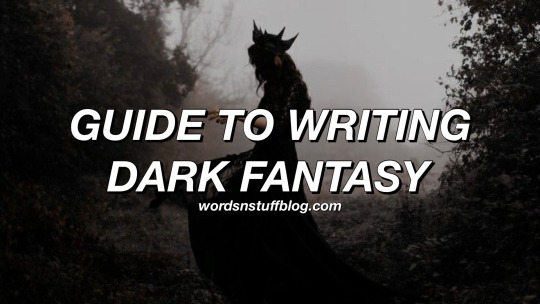
Patreon || Ko-Fi || Masterlist || Work In Progress
–
What Is “Dark” Fantasy?
Dark Fantasy subscribes to the tropes and conventions of fantasy, while mixing in elements of the horror, thriller, and sometimes dystopia. Loosely, the magical elements of fantasy take a gloomier, more frightening turn. Dark fantasy is not simply “fantasy, but make it sexy or gory”. (I’m talking to those who cite Game of Thrones as an example of the genre.)
Yes, a lot of authors choose to incorporate heavier subject matter into dark fantasy stories, but things like rape and copious amounts of gore and death are not genre-defining. Darkness exists in every adult story, even if it’s only in symbolism, but the darkness in this sub-genre specifically persists throughout each scene and coats every element. This includes character development, plot development, world building, etc.
Death Still Has to Mean Something
Something you have to understand about dark fantasy is that death can be a tool, but the nature of the genre shouldn’t make it any less impactful. When a side character or an extra gets killed, it should affect the reader emotionally, even if death is very common. If the death isn’t going to surprise them, it should unease or upset the reader. Death should never serve the purpose of filling space.
Incorporate The Horrific
A lot of dark fantasy authors and writers have trouble or fail to incorporate the dark elements in a rounded, even manner. A lot of authors go for the “show the reader something undoubtedly tragic or traumatizing and the tone will endure” or the “if I sporadically kill characters for no apparent reason throughout the plot, the reader will stay disturbed and none will be the wiser”.
The Villain Is The Key
The antagonist must be complex and compelling, and you have to use them well. Dark fantasy is a genre which depends on a fantastic villain or antagonist. It’s wise to create an antagonist whom the reader can understand, but who is severely misguided or obviously facing their own demons. Stories with a standard “I’m evil because my mommy didn’t love me” or “The world has been unkind to me so let there be fire” villain is outdated and, at this point, you have all the opportunity in the world to do better.
If there’s one place where you should invest your creativity, make it the antagonist.
The Darkness Is In Everything
Incorporating horrific things into fantasy is what makes this genre, true, but it has to be a consistent effort and an author must play the long-game. The darkness has to penetrate your word choice, the way you deliver new information in the text, the way you build up to important events, etc. The horror shouldn’t just spurt out every couple of chapters. You want to create a dark atmosphere, and an atmosphere must stretch beyond one or two scenes here and there.
Flawed vs. Unlikeable
This is a major downfall of a lot of dark fantasy works. It’s difficult to create a character whose flaws are so integral to the storytelling without making them unlikeable, but if you don’t toe this line carefully, your readers will put the story down. Yes, the character must be flawed and complex, and there are no heroes in the situation, but if there’s nobody to have hope for, then the reader will abandon the story. Nobody wants to sit and watch something that is sad and frustrating for the sake of depressing themselves. Well, some do, but not enough to convince someone there’s a market for your story.
Common Struggles
~ How do you craft a dark fantasy ending?... Not all pessimistic stories have to have a pessimistic ending. You can give your characters a positive outcome (or even just somewhat positive) without sacrificing the work you’ve done to maintain the genre’s tone and message. Most dark fantasy is about topics that are larger than the story itself, such as equality (in many aspects), existence, freedom vs. security, society vs. individuality, etc. Dark fantasy tends to branch off from the typical fantasy in terms of messaging because incorporating darker aspects of reality forces the reader to face harsher truths. Make your ending about what you want the reader to walk away with, and you should have no problem figuring out how to do it.
~ How do you warn readers of possible triggers in non-fanfiction works?... Simply put, market your story honestly. Disclose any especially dark elements, and when advertising on platforms such as social media, perhaps provide an official disclaimer. The manner in which you warn readers of possible triggers is up to your own and whatever marketing team you have’s discretion.
~ How do you research dark topics while writing?... With purpose, caution, and practicality. I see a lot of posts that cover very tiny details that may go into fantasy, and while I encourage research of all kinds for every genre, I think fantasy is one where writers can get so caught up in getting every minute detail researched and recorded that they get burned out with their own ideas before they even put pen to paper. Research what you missed, then find holes as you write, and then do the rest of the research for the second draft once you’re finished with the first. Avoid burnout that comes with extensive research beforehand.
~ How do common fantasy tropes interact with darker aspects of the sub-genre?... There’s a lot of ways you can mix typical fantasy with typical horror/thriller and come out with dark fantasy. The main fantasy characteristics that persist in dark fantasy are setting and the way magic systems are executed in the story. Secondly, I see a lot of similarities in general world building. Where it deviates, I think, is in character development, plot structure, plot development, and messaging. The smaller events tend to be more mature, the character arcs turn more raw, the characters themselves are more flawed, and the plot develops in a much less linear fashion. The messages are heavier because the content is heavier.
Other Resources
Resources For Fantasy/Mythology Writers
20 Mistakes To Avoid in Fantasy
Guide to Writing Fantasy
Guide to Story Researching
Commentary on Social Issues In Writing
On Writing About Sensitive Topics
Resources For Writing Royalty
Dark Quotes & Prompts
Angst Prompts
31 Days of Character Development : May 2018 Writing Challenge
Suspenseful Prompts
Sad Prompts
31 Days of World Building : August 2018 Writing Challenge
31 Days of Plot Development : January 2019 Writing Challenge
31 Days of Horror : October 2019 Writing Challenge
Resources For Creating Characters
Giving Your Protagonists Negative Traits
Writing Good Villains
Showing Vulnerability Without Death
Giving Characters Flaws
Creating Villains
Flipping Character Traits On Their Head
“Male characters are more relatable”
Tips on Character Motivations
Tips on Character Consistency
Resources For Plot Development
Guide To Plot Development
How To Write A Good Plot Twist
How To Foreshadow
Plot Structures
Describing Setting
Resources For Worldbuilding
Guide To Political World Building
Creating Diverse Otherworld Characters
Tips on Creating Magic Systems
Tips on Introducing Political Backstory
Resources For Writing (Global) Period Pieces : High Middle Ages & Renaissance
Resources For Writing (Global) Period Pieces : 1600s
Resources For Writing (Global) Period Pieces : 1700s
Resources For Writing (Global) Period Pieces : 1800s
Tips on Writing Fight Scenes
Tips on Writing Chase Scenes
How To Make The Journey Interesting
Tips For Horror Writers
Tips on Writing Pyschological Thrillers
10 Mistakes to Avoid in Horror
–
Masterlist | WIP Blog
If you enjoy my blog and wish for it to continue being updated frequently and for me to continue putting my energy toward answering your questions, please consider Buying Me A Coffee, or pledging your support on Patreon, where I offer early access and exclusive benefits for only $5/month.
Shoutout to my $15+ patrons, Jade Ashley and Douglas S.!
#writing#writeblr#fantasy#dark fantasy#fantasy writing#writing advice#writing help#writing tips#writing resources#resources for writers#writing reference#guide to writing
2K notes
·
View notes
Text
In Defense of Hunter, Wrecker, Tech, and Echo
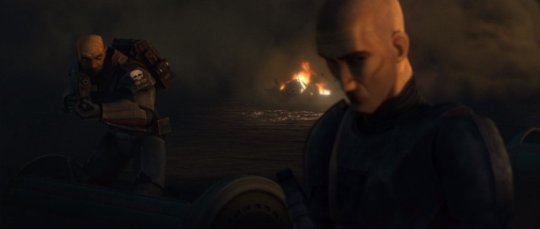
I want to clarify that I like Crosshair. I used to love him and I just kinda like him now, but he's a great character. I hold nothing against his fans. I just want to talk about how people are slandering these 4 like they did everything wrong when everything they did was pretty justified.
I need to talk about Crosshair's chip, because that affects how we all view these final episodes. While I agree things don't add up completely, Cross has no scar, nursing a headache, etc., his behavior DOES indicate he is telling the truth.
Chipped clones have been shown to show loyalty to the Empire above all else. They killed the jedi, they'll kill innocents, they forget all sentimentality, and we see with Jesse that they will more than happily die to accomplish the chip's commands. The Batch has experience with this with Captain Grey in the premiere and later Wrecker. Chipped clones are basically battle droids.
Crosshair does not act like that at all. He shows sentiment and loyalty to personal history, he defies orders to even kill his fellow imperials, and he puts aside his anger in order to escape Kamino. NONE of those things are congruent with him having a chip in at all. So while it doesn't add up completely either way, the evidence honestly seems to favor that he's telling the truth as his behavior is a huge tell that has not been shown to be able to be countered for more than a few seconds (love you Rex) while an absence of a scar could indicate a variety of things and the headache can honestly just be chronic pain from his insane head injury in Episode 8. I'm not saying that is the truth, but what I am saying is the evidence provided can easily line up to more than make it believable that Wrecker, Echo, and Tech believe he has it out.
Wrecker does know what a chip feels like, so we all expected more empathy from him, but Crosshair is not acting the way did Wrecker did AT ALL. Wrecker lost all control and immediately tried to kill the people he loves most, while as stated Crosshair is exhibiting almost opposite behavior. Wrecker knows what a chip does to you and Crosshair is definetly not showing that, so why would Wrecker show empathy for it? Wrecker knows first hand that is not what the chip does to you so it more than makes sense that he sees Crosshair's behavior and story and believes it.
Crosshair's intense feelings of Supremacy and loyalty to the Empire are not out of no where. We see in TCW that he is incredibly cruel about regs, he has always hated them. So considering the journey he went on this season it does feel like a realistic progression of belief.
Crosshair also is hurting his own cause here. Now we as the audience know for sure he had it in for Episode 1, we are shown explicit evidence. We have no idea when he got it out though due to the lack of a scar, and his refusal to specify hurts him here because what he actually did as himself vs. chipped is VERY important. I also want to say that while the audience knows Crosshair has the chip in in Episode 1, no evidence is provided to the Batch to know that, so Crosshair saying he had it out "a long time ago" means it is reasonable that the Batch could even suspect everything he did since Episode 1 was him. And here's a quick rundown of some things he did this season that the Batch would know about:
Obeyed Order 66 and shot at a child jedi even when ordered to stand down
Advocated to kill civilians to the others
Shot Wrecker and used him as bait to lure the others out
Lead dozens of Troopers to Bracca to kill them
Went out of his way to order his troops to kill Omega during that confrontation within earshot of Hunter
Tried to burn them all alive with an Ion Engine
Contributed to the oppression of Ryloth
Arrested Howzer, a clone who was trying to do the right thing
Spouted supremacist jargon about how they are superior to regs (something Hunter, Tech, and Wrecker have been shown to be softening up on)
Said the might of the Empire was the only way and basically gave them all the choice to join or die.
And remember, our heroes just got the revelation that potentially all of those actions were taken of Crosshair's own free will. They have every right to be harsh or unwelcoming after that. Sure they didn't try to rescue him but he also tried to put multiple blaster bolts through their heads, no one is innocent.
So the general coldness and harshness is more than understandable considering that Crosshair just admitted to trying to get them all killed on multiple occasions on his own free will, that would sour your relationship with anyone I reckon, so why are they expected to be okay with Crosshair doing all of that?
Anyway, to specifics. When Wrecker says Crosshair never even tried to come back and that they would have taken him, there is truth to that. During both Bracca and Ryloth, Crosshair was right there and had opportunities to turn heel and help them all escape, but he never did. I've seen this described as victim-blaming but you guys need to realize that Crosshair has potentially done ALL of this of his own free will and is actively trying to pull the others to the Empire. Wrecker is right, Crosshair put more effort into killing or converting them than he ever did in returning. It's harsh but it's true.
And Tech saying it's in his nature is like, classic Tech. I don't necessarily agree that they all have set paths due to their biology like Tech does, but Tech began this season rattling off about how Wrecker was made to be the way he was, this is just how Tech rolls.
The one I see a lot is after Crosshair rescues Omega and they still have the guns up and then never thank him. First of all, Crosshair never thanked them either for saving his life so let's not go around expecting any shows of gratitude from everyone. But more importantly, how were they supposed to know that Crosshair was saving Omega? As a viewer I legit thought he was aiming for Hunter there, it makes more than enough sense that they pulled their weapons on him. And considering their recent history, it makes sense that all three of them keep their weapons up longer than needed, both Hunter and Omega are potentially at risk. We all saw how quickly all of them drew their weapons in Episode 13 at even the slightest hint of danger to Omega. Considering everything before, it makes sense they kept them up until he disarmed himself, that's just good self defense honestly.
And my final point:
CROSSHAIR WAS NOT ABANDONED AT THE END OF THE SEASON
He was given multiple invitations and opportunities to join. Sure, he was not made to feel all that welcome, but even after all of the season and the finale, Wrecker stops to ask if he is coming and Hunter gives him one last chance. He was given many opportunities to go with them. He said he made his choice, that isn't abandonment, that's stepping away.
In Conclusion
Honestly all 6 of the main characters really dropped the ball on this season's conflict and no one is blameless or unjustified.
I'm not mad about it because it makes for compelling character drama, but everyone involved kinda didn't do their best, so maybe let's not slander one side over the other?
(Small lists of commenters who showed interest is seeing this: @violettavie @shilsvampsinger @rain-over-kamino )
131 notes
·
View notes
Text
An AU of DC with a mass crossover of PS4 properties.
Provisional name: Players Searching for Detectable Changes (Get the pun?)
The setup:
This is the future of DC, a world where the old guard has slowly withdrawn and the newer generations have risen to the occasion. The original Titans in particular, most of which have formed the new Justice League while many other, very similar teams had started to form across the world. One of which was a resurgence of the Teen Titans, led by an older and purified Raven. She wanted to make the Teen Titans something akin as it was for her, a place to belong and learn to use one's powers.
The first 'class' of such individuals include:
Stargirl (of the now-disbanded JSA and still getting used to the Starrod)
Blue Beetle III (Freshly attached to his alien symbiote and freaking out a bit)
Robin V (to work on his anger issues, mostly at the new Batman's request)
Kaldur (a half Atlantean half metahuman who is struggling with his identity and the surface world, Aquaman feels a kinship for the boy seeing their similarities)
Static Shock (a promising new hero but little experience working outside his city or in groups)
Mary Marvel (she's... she's going through alot. Fresh from a coma, her brother is distant as he acts as the new Wizard, and she may be, sorta kinda, being corrupted by Black Adam's gifted power)
The team was rough and there was plenty of head butting (Mostly between Stargirl and Robin/Damian as one is almost the unanimous leader while the other thinks he should be) but they were getting there. They were more of a clean up crew for the Justice League, they did more than the "kiddie missions" that the Outsiders didn't do, and they meant more than the PR grab that was the International team. Though they didn't seem to amount to more than that. They still did their best, pushing past the silent ridicule, as they went about their missions.
This may be why tempers were so high that day.
One day, outside a little city by the name of Weller's Point, the prisoner transport for the villain Plasmus had an "accident". Released and awakened the creature went on a rampage, heading ever closer to the populated area. Luckily, the mentor of the New Teen Titans could teleport. The new team did fairly well in the fight, though they did struggle a bit as Plasmus was not a being where simple brute force would work. It made the fight tricky and more than a bit... messy.
Messy enough that juvenile and emotionally compromised Mary Marvel lashed out against the downed villain but was stopped by her teammates... things escalated from there. Restraint turned blows and the whole team struggled to stop their powerhouse without hurting her. The ones who do the best are Raven, Stargirl, Blue Beetle, and oddly Static.
While both of the former could use their abilities to restrain her to a very effective degree Static was actively draining her of strength, or at least of the electic aura she was radiating and blasting with. Frustrated, done with the situation, and a bit petty Mary launched her largest attack yet by saying her magical word.
SHAZAM.
Virgil did what he did best, he handled that lightning as it came crashing down towards Mary and the Titans restraining her. Well, he tried. The bolt was just too powerful, too unlike anything he had ever encountered. He could not handle it and it was dissipating, if anything it clung to him or tried to jump towards the girl. He had to get rid of it and he had to get rid of it quickly, safely too if he could help it.
He shoved it into the ground, into the power lines. He did it as carefully as he could, trying to prevent overload or flashover as guided the charge into the power grid.
What happened next was a combination of a few things. 1. The Mystic and transformative properties of the Lightning, 2. It is effectively being filtered through a bang baby, 3. The kryptonite power plant owned by, provided by, and operated by Lexcorp.
This interaction, this new charge, cycling through the power grid interacted strangely with a number of devices but none more so than PlayStation 4s and the devices connected to them. This new electricity changed things, literally. It brought fantasy into reality.
Whatever game was loaded into became a part of our reality in a small way. Sometimes TVs, Controllers, and even the system changed to reflect items from the game but the bigger change came with the Players. If a person was playing their console during the surge then they would become a metahuman with abilities based on the playable character they were playing.
The city, the county even, was now flooded by an abundance of metahumans and items of varying power of devastation. Static felt horrible.
He couldn't help but compare what has happened here to what happened in Dakota City but on a wider scale. And this time it was his fault. His sense of responsibility wouldn't, couldn't, let that stand. He had to fix his mistake and his team was dragged along for the ride.
The story to follow is a mix of Final Crisis and Kingdom Come with a bit of the Young Justice cartoon in events and themes, a few twists and likely a bit lighter in tone but to the DC geeks this should give a rough idea… Maybe a bit of Marvel's Civil War but hopefully not the rushed knee-jerk mess that that ended up being.
But it's here that I start having issues with my planning. One part in worry as outside the set up we start to follow the perspective of OCs (something rarely smiled upon) and another part in wondering which OC to focus on.
Now, one thing I love in fiction is progressive powers and the conflict escalating from the different paths people take in said progression. In that vein, I have a pair of protags in mind as well.
The main two/co-protagonists:
The Lawkeeper- a cop before the change and now a member of a task force made up largely of those affected by the surge. A gamer, a man of color, and a believer of the spirit of the law. He doesn't always get along with his fellow officers but he believes in what the blue does. He believes that an organized response is what is best.
His abilities are based on those of Jesse Fades of Control. Meaning he has tremendous psychic potential but he needs 3 things to reach his full potential.
1.Items to bond to so he can generate these psychic abilities. Jesse's used altered items of her universe to get thematic abilities from them (ex: a safe to generate a shield, a carousel horse for a dash ability, ect). Here he can use items generated by the surge.
2. A patron/partner entity to help guide, give insights, and empower. It also let's the user enforce reality, basically becoming an anti reality warper.
3. A bonded morph weapon or a weapon to come to his hand when called.
The knight- a recent college graduate who instantly decided to go the route of the caped hero. She, after figuring out how to get her powers to work, instantly went the route of a caped crusader. Going out to the streets, saving lives, stopping instances of surge item abuse, and (in the humble opinion of the local Police Department) getting in the way of operations. In her opinion they were taking too long to get things done.
Her abilities are based on those of Prince Noctis of Final Fantasy XV. This means she has tremendous physical and magical potential but like the above she has a number of check marks needed to gain access to the character's full power.
1. A gem/crystal to draw power from.
2. 13 magical weapons to boost strength. The generated game weapons will do and I have most picked out in a way that likely would help the plot progress.
3. The blessing of 5-6 gods.
4. A power ring of some king to channel all this power.
I keep debating the two above as I do like the idea of both of them climbing in power and clashing over conflicting ideals of what to do with their power. At the same time, I think that just smooshing aspects of both into one (which is actually where they started, a single character) and play off the different ideologies of how best to help people from within her friend group and precinct along with internal conflict. Maybe have the one be a fellow officer they butt heads with because of the... precarious nature
Another OC I was thinking on, keeping with the theme of what to do when you have power, is a thief who played Persona 5. Like both of the above they would be crippled in their ability to use their abilities without a way to fake the connection to. In this case, without the Mementos App, they would need an item that could affect or enter the hearts of others. Luckily, more unlucky really, there are plenty of items floating around that can do just that. Namely Keyblades.
Most other Players are an odd mix but most are variations of the Shooter build. Peak physical humans who heal quickly and often have bullet time. But there are enough other variations to cause trouble. Demigods of unreal strength, men and women who can easily tap into a patron for powers from the outside, 2 variations of spider powers, cat eyed men and women who can cast magic with simple gestures, and so much more. But the real issue was the first two, the demigods without a parent to protect them and those easily connected to a divine source.
The disembodied New Gods of Apocalypse were very happy with those groups. For how bad this can be please look at what happened to Mary Marvel in canon Final Crisis.
Thoughts and opinions would be appreciated.
#dc community#fanfiction#dc fanfic#dc fandom#playstation#mass crossover#orginal character#dc fanfiction#dc fanfiction idea#outline
25 notes
·
View notes
Note
Hello, bright i have a few questions do you have any tips when it comes to writing au's and storylines? does it come from inspiration or just following your head?
Both I guess? I don’t know how to answer this very well.
For making AUs: depends on what kind of AU, I think the main kinds of AUs are just “i change things however I want” or “I change this one/few thing/s just to experiment and see how things could’ve happened differently”. For the second one, you’d have to make sure you know the canon characters well to determine how they’d most likely be if that change was present.
For storylines: ,,,,, Study basic plot structures I guess? The Hero’s Journey, Character Archetypes, Cause and Effect, worldbuilding etc. etc.
Something I often do is go and watch critiques of books and movies on Youtube to get advice or examples (of what to do or what NOT to do)
Figure out the main premise of your story and the main characters’ basic personalities first. Give those characters goals, quirks, I like to give each character some sort of unique theme or gimmick (I even colour code them often haha) and backstories. Best if the backstories are somehow connected to their unique world or the plot, or if not that - they have some sort of emotional importance.
Think of a beginning and end first. Then think up of some MAJOR-ASS MILESTONES in the story and place those between the beginning and end. These MAJOR-ASS-MILESTONES can be like plot-changing revelations, broken relationships, something big that changes the course.
Then you can think of/list smaller milestones between those and then even smaller ones, side plots, side characters, little things that happen along the way, character/relationship building moments yadda yadda
Then find a way to connect all these events in a cohesive and natural way. You will get rid of some milestones, add in others to make this work but it gotta make sense. Use the 3 Act structure to help but that really depends on what kind of story you’re writing.
I heard this one advice somewhere- if a scene isn’t building character or progressing the plot, then get rid of that scene cuz it’s essentially pointless. Building character could just be characters in their element, talking to others, personal drama, humour-based moment. Plot progressing is,,, plot progressing, shit happening.
My stories/plots/ideas come by my brain organising various things I’ve seen/heard/felt into a force of inspiration and I suddenly come up with some image and then I’m like “now lets add story to it” and that’s basically where I begin.
Basically for the most part just go fucking nuts, but when you actually wanna sit down and write it like a novel or draw it like a comic, organise that shit and think it through.
#advice#storytelling#idk what im doing i have never made a fully finished fledged out beginning to end story in my life#like right now i'm at the adding smaller milestones part#or maybe even slightly before that i'm like in the middle between stpe 2 and 3
220 notes
·
View notes
Text
Ducktales Della Arc Reviews: The Spear of Selene or THE INCREDIBLE STORKULES, GOD OF HOMEROTIC SUBTEXT OUT OF MYTH!
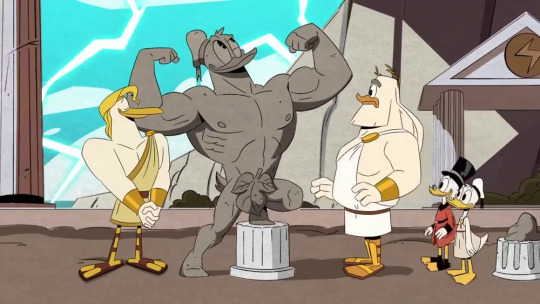
Hello all you happy people and welcome back to my coverage of the Della arc! It’s our last 2017 episode before the Finale, and it’s a huge one as we delve into a fan faviorite that introduces a pair of fan faviorites, a drum of tzatkiki sauce worth of gay, an asshole so odious getting sent to the bowls of hades and laughed at for all enternity after being cast out by eveyrone he knows really was getting off light, and at last some plot progression on this arc. At the time it aired mind you at this point Dellas been a beloved cast member for three years, and we’ve known what happened to her for longer than that.
At the time though.. it’d been 8 MONTHS since the Great Dime Chase. Let that sink in. The Della reveal was the biggest hook of an already exceptional pilot: It not only promised to flesh out a character who’d had all of one story in the comics at this point in present day, but solve the mystery of why she was gone. Not only that but Scrooge and Donald’s feud clearly stemmed from this exact moment. And the first full episode in the arc confirmed it: Della had taken whatever “The Spear of Selene” was and apologized to Scrooge for it. So why had she taken it, why did Donald blame scrooge, why did Scrooge not blame himself, at least outwardly, where was she, what was the spear of selene...
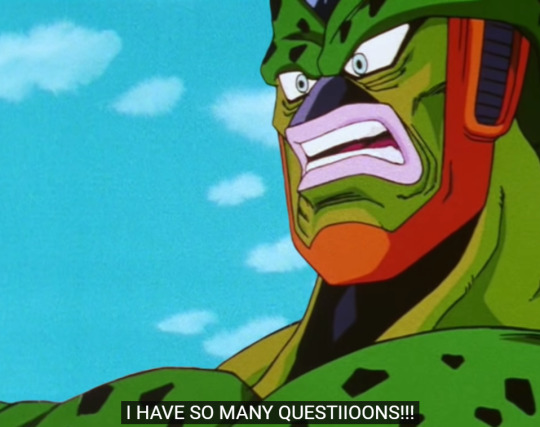
As I pointed out last time airing order didn’t help and due to airing the arc episodes really close together, gave the impression the arc would not only move fast but take up more of the season than it did. In practice both arcs take up a fourth of the season not including the finale, which would take both up to about a third. The expectation on how much of the season would be taken up by the arc.. was on Disney for airing things badly. I will give credit where it’s do as they moved this episode up in the order to try and make up for it (and give themselves a huge mid season opener).. but then for some reason shoved the last episode before last crash, ie. the only one they coudln’t move, way back to right before that episode. “ Here’s an actual photo of the person who made this decision

As I said they did get better next season with only a few swaps and only for good reason. So props.
HOWEVER.... this episode still has some flaws with pacing and revealing info, with or without Disney drunk driving the schedule. The wait between episodes in this plot is an episode LONGER in production order... and dosen’t move the plot forward by much. I will get to that when the time comes.. and that DESPITE this treatment of the fans.. this episode is still one of the seasons best. How are both things true? Join me under the cut to find out.
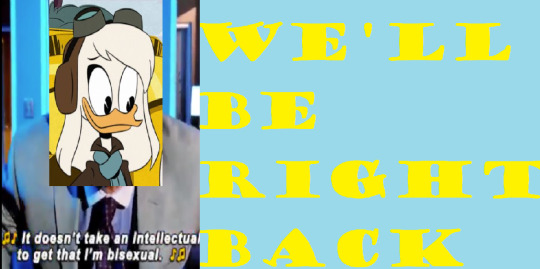
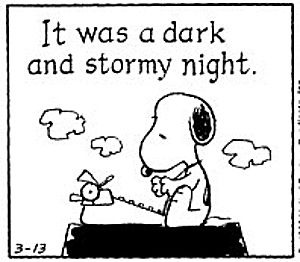
Thunderstormy to be precise and the Sunchaser is natrually encountering loads of turbulence with Launchpad barely holding int here while Donald’s buffeted around the back. Why Donald’s with them...
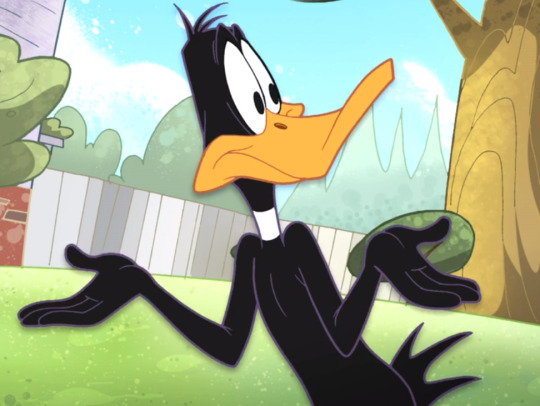
But it’’s one of his only five starring episodes in the season, out of 9 appearances total the rest of which are cameos. Yeah now seems as good as time as any to talk about Season 1′s Donald Duck problem.
See Donald was promoted as a major part of the series, rightly so since he was reduced to a guest star for the 87 series due to a combination of Disney not wanting to overexpose the characters, people possibly not being able to understand his voice and thus making plots hard to understand, and Tony Anselmo being new to the roll at the time. So the reboot went all out promoting the fact Donald would be in it, front and center and gave him TWO character shorts to the rest of the casts one. Disney really went out of their way to show he’d be in there so as a certified Donald Fanatic, I was sure he’d actually be in the show a lot and on the adventures a lot. The crew were not blameless as both promotional arts featured him. Launchpad and Beakly conversely were asbent, so the impression given by all of this was that Donald would be central to the series and in a lot of episodes, given equal focus to scrooge and the kids.
This.. didn’t happen as you all know. Instead as stated he’s up front and center for 5 episodes, and makes cameos in others, but generally is hardly around. Now there is KINDA an excuse to this as he doesn’t want to adventure, be in the mansion or any of that.. but it’s a REALLY weak one. He still at least could’ve made more cameos, the fact he was working on the boat all that time isn’t made clear till last crash, and his two spotlight episodes both have him dragged along on the adventure anyway, so it’s not like his not wanting to be there meant he woudln’t be forced to join in anyway. There were ways to include him, still have him in a supporting role instead of leaving him back at the mansion.. and even the second episode proved there was still comedy to be mliked from that.. and pathos don’t forget the pathos. So yeah this was easily the biggest mistake of the season and one season 2 largely corrected: He got four dedicated plots, and was around a decent amount in the first half of the season and while he DID get shot up to the moon... it was for valid reasons. They wanted to focus on Della and the kids, give her room to breathe as a brand new major addition to the show, and thus him being around and the elephant in the room of his and scrooge’s feud that was never dealt with on screen, would’ve distracted from that. And even with that they still gave him a focus episode that somehow added more depth and MASSIVELY advanced the main plot, and a sizeable roll in the finale. Season 3 likewise had things better: while he shows up as much as in season 1, the episode count is lower by one, and he’s a major part of the plot in every one BUT Last Christmas, with four of those having the spotlight on him in some way. They eventually did figure out how to use him far more ballanced. So yeah credit where it’s do it got MUCH better, but he still felt like a recurring character in his own series, that was still bad, and I still needed to give out about it.
But Webby and Dewey have a mission even if Dewey dosen’t quite get what’s going on so they flip a switch to turn on a warning light of some kind forcing Launchpad to make an emergency landing on a gorgeous tropical island. To Huey’s amazement, as the place was apparenlty only a myth, though naturally the guidebook did have it’s aproximate location listed... Ithaquack, home of the gods. Naturally Scrooge and Donald want to leave as soon as possible for reasons we’ll get into but Launchpad , for once is being a responsible pilot “Better safe than.. something right? Scrooge is of course irate that Launchpad picked NOW of all times to be safe, and the Kids.. don’t listen because Huey sees a beautiful realm of myth, Louie sees a beach vacation and Dewey and Webby.. have work to do. Webby eventually fills Dewey in on why their here, having wrongly assumed he got why they were going to a mythical greek island. As Dewey delightfully puts it later “Don’t assume I know anything. “ So she pieces it together for him: Selene was the greek goddess of the moon... Della took the SPEAR of Selene. Ergo this island is the best place to find the Spear and failing that, Selene herself to get more info on it and Della.
So we have our two plots. Scrooge and Donald dealing with their pasts and the gods, and Dewey and Webby diving into his mom’s past. And unlike the last review where a genuinely unsettling story about an abuse victim forced to manipulate her girlfriend not going into a murder vault was paired with Louie having to deal with a Sasquatch while Huey catches a case of Dewey’s stupidity somehow, these two plots are perfectly paired: Their both perfectly thematically connected, both dealing with the past, Della’s absence and Scrooge and the Twins past encounters with the gods.. but both being self contained outside of that, entirely unconnected but stilll necessary to be in the same episode. THIS is how you do two plots. But since they don’t really synch up again till the end, let’s cover each one at a time shall we?
“What if My Mom was a Bad Person?”
The plot is pretty straight forward but expertly done: Dewey and Webby first check your standard Zelda dungeon which apparently has a cursed weapon at the end. We also get an utterly adorable and sweet shot of Webby comforting Dewey after he’s clearly shook from it. Awwww. Turns out it’s the SWORD of Selene. and quickly turns into a game of put the Cursed Sword back before we all die.
Next up is a monster who nearly kills both protecting it’s spear.. the spear of POSIDEN. (Look at meeeeee). And since they aren’t going to be on a boat that isn’t a house boat anytime soon, they don’t need that and the monster cheerfully redirects them, with Dewey apologizing for calling it ugly.
So all pretty standard stuff for the show and really good stuff.. but it’s the building tension underneath that truly makes the episode and leads to one hell of a climax for this plot. All the while Dewey is DESPERATE for some explination for his mom’s disapperance that isn’t her betraying Scrooge, maybe returning the spear because it was cursed or getting eaten by a monster. Just ANYTHING but the mounting and horrifying suspicion.. that his mom was a bad person who destroyed her family and betrayed her uncle and laughed all the while. Webby.. does not help, backing that side of things and constantly voicing hte idea Della betrayed Scrooge, so obsessed with solving the mystery of her life.. but so unfamilliar with people she dosen’t see the very real toll this is taking on her best friend. To her she’s just making a logical counterpoint.. to him it’s just another idea in his head about the way his mom could’ve betrayed everyone she cared about.
So that climax is where it explodes. Our heroes find a scale model of ithaquack (Complete with Tiny Maniticore! It’s so cute Webby just wants to slay it)�� and an opening.. with an ominous message about incurring the wrath of the god seemingly conforming the worst. So Webby prepares to find out the whole story.. only for Dewey to stop her. No one’s finding this out, whatever it is, no matter how far they’ve come. And given this is the biggest mystery of her life and she simply dosen’t understand WHY Dewey dosen’t want to know.. both sides are ready to fight for this. And Webby DOES try to back him down, pointing out he really can’t beat her in a fight. But Dewey’s already grown leaps and bounds form the pilot and is working smarter not harder. Beat Webby, who spent a good chunk of her life being honed into the most badass child on the parent, one who can take on several of scrooge’s worst foes one on one? Not on his life. But hold her off long enough for the gate to close? He can do that.
So the result? One of the best fights of the series... and given the sheer amount of great ones we’ve gottten since this one it still says something it holds up THIS well. It’s an even, furiously paced fight, with Dewey using every advantage he has including tossing said manticore to keep up, but not slowing down one bit. It’s heartbreaking to see the two come to this but it’s an delight to watch. Webby DOES win eventually, though time’s running out to get in and she finally asks WHY. And while the stakes have been crystal clear for both this whole time.. we get them laid out in the most painful way for both.
Webby: We're so close to the truth! Why won't you let us find it?! Dewey: Because...*his voice cracks* what if my mom was a bad person?
It hits VERY hard. For Webby this has been a puzzle something to solve the greatest achivment of her life, her chance to make her mark... and her best friend just wanted to abandon it. But in one swift response, he disarms all of that.. and makes her see how insnstivie she’s been: He may not know his mom.. but he can’t bear the thought she was a bad person. That she left or WORSE, because she didn’t care about him, or scrooge or ANYONE. Knowing nothing is better than knowing she was a monster.
Webby realizes what she’s been doing to her friend and is horrified and offers to back out. The answers.. aren’t worth destroying her brother. But her willingness to back down.. finally gets Dewey to see the light. His fear was valid.. but at the end of the day, it’d never go away. it’d just keep eating him for the rest of his life, every time she was mentioned or he found something else out he’d just wonder if it was a lie and wonder wht he COULD’VE learned this day. And if Webby’s willing to sacrifice THIS MUCH to give him peace of mind... then he can sacrifice that peace of mind for the truth, for her, and for himself. So he pulls them inside.
Inside they find Selene who suprises them.. and is then confused. Their not della. Also I guarantee mentally she’s thiking “Thank me I didn’t do it naked this time. “. After some confusion as to who this is, Webby explains that IS Selene, and Dewey begs for answers about the spear... only to find out she dosen’t have one. Nope. The sword seen before and a SPHERE, yes.. but no Spear. So the poor boy breaks down, back to square one. It’s hard not to see why... all this effort, all of this sacrifice.. and he’s no closer than when they first set down.
Selene does help though... giving him an idea of who his mom WAS: one of her closest friends (And let’s face it Della named the ship after Selene and Selene casually uses Della’s shower. If they didn’t go out at least once, I am an outer god. And I very much am not and they very much banged hard. Goodnight. ) , a good person who brought fun to everyone, and loved her family more than anything. Wether she betrayed Scrooge or not, she wasn’t a bad person. And her own orb shows it showing Della in her prime, brightly smiling next ot her family. Selene encourages the boy not to give up, that his mom always loved a mystery.. and he can solve this one and gently hugs the sobbing child.. with Dewey quickly pulling webby in. It’s genuinely touching and a satisfying ISH ending.
The ish... is because while this is a VERY good plot, i’ll gush more about it at the end, it does have one supreme flaw: the mystery dosen’t progress. And with the huge gaps between this episode and hte next one, in BOTH airing orders... it’s unforgivable to not have EITHER plot give us any hints about what happened. I don’t ask for much, but they could’ve found a clue in the sphere Dewey got, or saw a memory of her that brought up the next place they look, just something a little. While it’s still a very fine story, the main plot suffers a bit by having one of the ONLY three episodes delving into the della mystery before it’s fully revealed in sunchaaser have almost no progress. Della was probably a good person, which comes from her ex who clearly still loves her so that’s not really reliable, and the spear isn’t literal. While the lack of progress works for the story in the episode itself.. it comes at the cost of any actual plot progression. We end up exactly where we started and have to wait SOME TIME before we get to the next spot on the tour. Well we did, you guys will find out Monday or Tuesday depending on if the finale goes up in the morning or Disney holds it till the actual airing. Please don’t you bastards. Point is it’s VERY good plot, but it’s hampred by not really progressing the arc.
The arc progression for this storyline is painfully slow, and tha’ts not on disney. In either order there’s a MASSIVE gap of 15+ episodes between what we learned in the great dime chase and what we learn in castle mcduck. It’s sloppy writing and I expect better from this team, especially since the Lena plot the same season is far tighter paced: each one builds a bit, both on Lena as a character (Why she’s doing this etc), her development as a person, her relationship with webby growing and Magica and her growing more and more spiteful with one another. They could’ve had at least ONE MORE subplot to build this up, especially since we really dind’t need the sasquatch episode but just.. didn’t for whatever reason and it’s still frustrating. But as always credit where it’s due.. the next two seasons were better about it.
Season 2 while not perfect, and we’ll get to it’s plots someday.. and I do say plots as not alternating between the two plots for season 1 was a mistake if a well meaning one as not to drive up the price for Kev but for future refrence if any of you want me to cover an arc for something I WILL have to cover all of it or any adjacent to it that flow into it. Point is they move faster and both Glomgold and Louie’s are pretty lowkey and low stakes so while enjoyable, their not moving incredibly fast dosen’t hurt the show. And the Moon plot has the best pacing of the three and possibly of the series plots period: We get filled in on Della fairly quick, getting answers on her WAY faster, get introduced to the moon and it’s people right away, get a whole episode on them, and the most importantly in sharp contrast? She returns HOME halfway into the season.
I will probably go into this again when I get to nothing will stop della duck but Season 1′s pacing and general wisdowm made me think she wouldn’t get home anytime soon and she’d return in the finale. Instead? We get a whole half a season fleshing her out further, seeing her connect with her kids, all that good stuff, WITH an episode advancing the moon arc, without that arc feeling unimportant, but still having the slow pacing.
Season 3 meanwhile while again not without bugs, the last few episodes before the finale having no real build up to it really wasnt a good idea and I question why these two episodes were the ones leading into it, has two seemingly barely related plots.. that EFFORTLESLY merge into one, with one hell of a huge twist in impossibin that ratchets up the stakes. I don’t know how it’ll payoff.. but we’ll see.
So they did get better, i’m still hard on it because it happened.. but I will never stop stressing how this crew usually corrected a mistake. If they fucked up, they LEARNED FROM IT, course corrected, and made it better and they listened to US. IN the good way, not letting fans run the series but listening to valid concerns and adapting to them. And given how fucking rare that is and how hard it must’ve been with the tight schedule, I.. I really appricate it and i’m going to miss it. And I can’t think of a segue so enjoy this picture of a turtle hitting a trapper in the face with a bat instead.
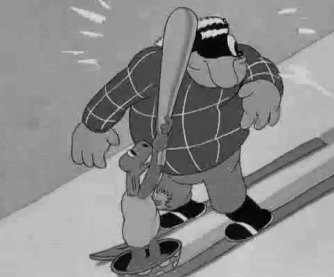
“Someone Always Gets Hurt”
So let’s take it back a few hours. Hit it boys!
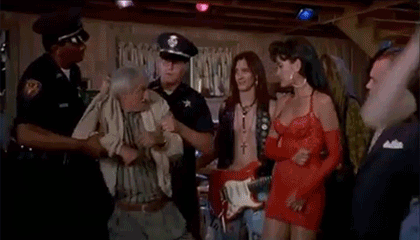
Donald tries getting the boys back on the ship, clearly fearing something coming for him.. and we soon meet that something. Yes it’s the hero of legend, the stork out of myth, the star of a LOT of Donald Duck Slash FanFiction only half of which he wrote, STORKULES!
In case I didn’t make it clear when I reviewed New Gods on the Block! I love this guy. He reminds me a LOT of the marvel version: Boisterious , horny (if in a far more pg version), Gay (Pansexual for the marvel version), flawed but still immensley likeable. Stork is a bit diffrent, a bit more naive, a bit peppier and entirely blind to the fact his father is a terrible person. But my love of the marvel herc means Stork was an easy sell for me and Chris Dimatopolis’ performance is second to none, only topped in this series by his later work as Darkwing where he got a bit more range than “Joyous ham who wants to bang”. Also I’m 100% convenced he’s made this memetic expression to donald at some point...
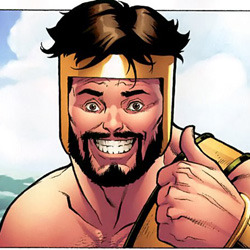
If someone hasn’t redrawn that with Storkules yet, we have failed as an internet. And if someone has please show me.
His crush on Donald is also endearing even if I don’t ship the two. And if your curious as to why it’s simple: Storkules is attracted to a version of Donald that no longer exists. Storkules craves a Donald whose a brave daring hero who loves adventure. And while still a brave hero when the situation calls for it as this episode will bare out.. he just.. dosen’t have the passion for adventure he did as a kid. While a LOT of that is loosing his sister for a decade, even once he makes peace with that and later gets her back... he just wants a normal life. His greatest wish was for one. He apparenlty “wishes for this every day”. He dosen’t hate adventuering anymore and by season 3 has come to terms with the fact he’ll never get everyone else to stop.. but I also think it’s always been obvious he clearly wants to one day. To have a normal life, settle down, find a girl, and if she wants to get married. Get old , fat and happy. I honestly think that’s the direction the finale’s heading in judging from the previews. I don’t think he’ll ever stop entirely, his family life’s too insane for that.. but he just dosen’t want to keep going forever and Stork, being an immortal hero does. They want diffrent things entirely and that just won’t work. Though that’s also JUST me and if you ship them or have a way around that, feel free. This is just my opinon.
Anyways Donald’s not happy, the kids are confused and Scrooge. has problesm bigger than simply not knowing how to say i’m not into you.... aka Zeus, king of the gods and of all assholes. He was originally supposed to be a swan due to a certian myth.. but they realized since that myth is both really fucked up and really not for children to not do that because why the fuck would you. Point is Zeus in myth is an asshole, a rapist, a cheating husband, and a vengeful, petty dick and that’s with barely any knowledge of Greek Myth on my part. He’s played by Micheal Chiklis whose famous for The Comissh and the Shield.. but whose famous to me for playing the ever loving Blue Eyed thing in the Tim Story Fantastic Four movies.. and honeslty, at least till marvel takes a crack at it soon, is the best screen version of the character. Look the film is flawed and I don’t remember a lot of it.. but his stuff in it just NAILS the character perfectly, at least the first one, and while the look is.. eh, he was the perfect casting. He just wasn’t in the right movie. So he’s naturally awesome here as history’s greatest douchebag.
As for why Zeus is pissed at him unlike say Donald (The whole Spear of Selene fiasco) or Magica (Who while even worse than Zeus still lost her brother because of his callousness), or others he’s wronged.. Scrooge did absolutely nothing wrong here. During a beach party Storkules intiates, he reveals he used to be king of the beach and loved and worshipped by the people of ithaquack, which last time the adult ducks visited was a lovely hideaway for heroes. Scrooge naturally did a bunch of heroic and cool stuff, and upstaged him, and then bested him in various games and what not. Zeus claims they ran off because of this and because they didn’t want to party with a god bested by a mortal.. but scrooge reveals pottery showing it’s because Zeus threw a temper tantrum aka “a year long lightning storm”. So yeah for once all Scrooge did was just upstage someone who was already objectively horrible and who brought all of htis on himself. Scrooge even points it out perfectly “They didn’t leave because they liked me, they left because they didn’t like YOU. “
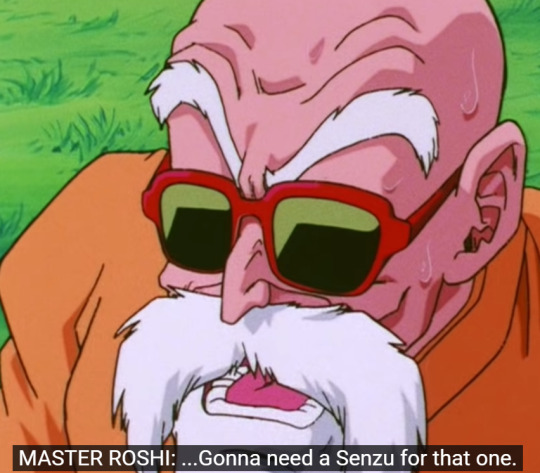
Pissing off the god who already didn’t like you for stupid reason goes about how you’d expect and when Storkules tries to cool things down by suggesting a game, Zeus turns it into a contest. His son against Scrooge’s nephews. Because he uh dosen’t want to lower himself. Yeah that’s it, totally not that Scrooge would kick his ass and then fucking kick his ass. Yeah that’s the ticket.
So our boys don Toga’s, and gear up for the first challenge: grabbing the bag of winds. In case you thought Spongebob just made that up. Zeus of course opens it so Donald can’t just leave, but Huey simply thinks his way out and wins , Zeus demands best 2/3 and we soon get a montage of various events from chariot racing to sculpture where we get our title picture, lest you thought I was kidding abotu Storkules obession with donald. I mean there’s subtextually having a character have a crush on another and then ther’es making a naked muscular statue of him. I.. I don’t even have a joke here. He made a naked muscular statue of Donald. The only way they could be less obvious without just coming outright and saying it was if hte statue was of hima nd storkules making out. And i’m 100% sure Frank, Matt and Dana, yes Dana Terrace was involved in this one i’m as unsurpised as you are, only didn’t do that because Disney said no.
Zeus declares one final round because he’s tired of this..e ven though he CLEARLY won the last one while Donald once again tries to just leave and Storkules finally calls him on it wondering why he’s given up adventuring and wondering what della would say if she could see him like this, having just given up and not caring anymore about any of ths stuff. “Well she can’t! Someone always gets hurt....”
And that one very sharp and painful line both outlines Donald’s arc here, and for the season, and makes it VERY clear why he retired and why I felt like he was already on his way and the spear of selene was simply the final straw. He gave up.. because he was just tired of it. Tired of being the one who got hurt.. and devistated when it wasn’t him that time. When he lost his sister for what he felt was NOTHING. Sure hte stars would be great but they’d done everything and gone everywhere..w asn’t.. wasn’t that enough/ Couldn’t they just be done? Couldn’t he just stop. The spear gave him an excuse to do what he always wanted, but it also caused him to harden up and view EVERYTHING about his old days of adventuring as bad when like most things i’ts not that simple., There were good times, sunshine, giant sized gay men obessing over you.. okay maybe the last part isn’t a plus in his book, but point is there was good and his arc is seeing that and realizing he can’t just cling to his pain. He has to let go so he can move on heathliy.
As for said final challenge Zeus tasks the boys and Storkules with stealing the golden fleece from a little girl. While this is part of a whole scheme... he undereistmaed his son’s valour and Storkules is naturally sent spinning over having to steal from a child and is sent into a crisis. Louie however has no such qualms, as he is a children.. and he’s also louie.. but as he tries to the child starts singing. As Scrooge puts it “nothing good happens when creepy children start singing. “ Very true, it’s usually a sign freddy kruger’s about to show up or your about to be taken by a miltiary orginzation obssed with The Doctor.
The boys plug their ears.. and Zeus’ plan becomes horrifically clear. Turns out he had no real interest in an actual contest this time, and has the child take control of Storkules to murder them. And gives the doucheist shrug imaginable when his OWN SON IS BEGGING HIM NOT TO MAKE HIM MURDER SOME CHILDREN.
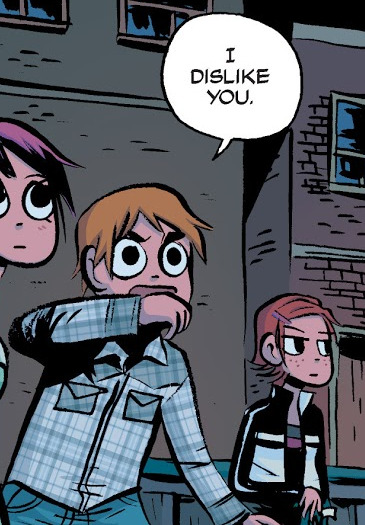
Scrooge naturally gets involved. Meanwhile Donald is trying to escape the lightning cage Zeus is using to make sure no one leaves... when he hears the boys cries of terror. He may hate this kind of thing.. but there’s one thing and only one thing that can make him snap back into who he used to be like it was yesterday. And that’s harming his boys. So Donald snaps into action and it’s a glory to see as Scrooge snaps back with him “Just like old times”. The two once again get a little closer to reconclisation by wrestling a golden pansexual to prevent him from brainwashdely murdering two children. God I love this show and this job.
Huey however is more of the aim for the head sort and Louie simply uses his natural talent to talk the siren into working with him, with him as her agent. As he puts it Zeus just wants to use her.. he wants to use her too.. but to make them BOTH rich. She agrees, Louie wins, and Donald finally accepts storkules is his friend. Scrooge TRIES to use this to mend fences with Zeus.. but Zeus being a petulant dick wants another game and Scrooge simply throws a game of billiards or something like it to get this over with.
So we get our wrapup. Dewey and Webby return, and Storkules and Donald say their goodbyes. Donald finally admits he’s his friend.. and in that one act finally admits he can’t just bury his past because parts of it are painful. And as Storkules puts it he may be done with adventure.. btu adventure’s not done with him. He’s got more of his old self in who he is now than he thought. Dewey also accidently wins and our family finds launchpad took the plane apart. There.. there’s no real ending. I can only assume Selene said knock this shit off when she found out or beakly later came in guns blazing. I don’t know.
Final Thoughts: This episode is excellent. It has it’s fault: there’s no plot progression, and the ending is just stupid and is the only one of the series that feels like nothing was resolved. That being said.. the rest of the episode makes up for it. It’s filled with great gags as usual.. but the real meat is the character work. Dewey’s worries about his mom, and Donald’s attempt to literally leave his past behind, it’s really amazing stuff that elevates the episode past it’s flaws and into one fo the series best. Wheras revisting Other Bin reminded me it had a bad subplot that drug it down.. revisiting this one showed me just HOW near perfect it is with only a few things holding it back. Even with the dispaoitnment factor.. this one’s still excellent, with Ben, Kate and Tony all at the top of their games. Great stuff.
Next Time on this Arc: Dewey has to face the future when the truth comes out. And Scrooge.. bitches with his dad for half the episode. Sure beats his dad sadly btu sweetly passing on to be with his wife huh?!
Next time on this blog: Amphibia time! Speaking of facing the consequences of lying to your family, Hop Pop’s FINALLY forced to face hiding the Box from Anne, and we also get an ivy episode. Super fuckin shooters.
If you liked this review, consdier joining my patreon, link’s in the blog and next stretchgoal is a darkwing duck episode a month. Until the next rainbow it’s been a pleasure.
#ducktales#the spear of selene#delene#della duck#dewey duck#donald duck#storkules#zeus#scrooge mcduck#huey duck#louie duck#webby vanderquack#ithaquack#reviews#della arc
33 notes
·
View notes
Note
Your analysis are interesting but feel overly bias since many aspects of the story you forgo despite them being influencers. In the case of the villains, so much of what makes them redeemable to the audience is seperate from their interactions with the heroes, the heroes only get to see violent killers and mass murderers who they have to stop and protect people. They are a immediate threat, so their not going to pull out the therapy chairs mid battle and that is not a flaw.
You phrase things like Shigaraki is only responding to violence against him which is false because through most of the story he was the one initiating attacks on the heroes (USJ, Hosu, Forest training) it's only after Kamino but by this stage he's already established himself as a dangerous threat to children and society - post Kamino it was mostly other villains but the reason Heroes attack his experiment is in response to intelligence of PLIF's planned attack. Heroes are mainly responsive.
I do agree with the point that there is a cycle of violence that has to be broken because the story has set up a good illustration of it's escalation but while the story reasons why the villains want to attack society that let them down doesn't change how the villains are going about that in a violent and deadly way that is going to spark a suppressive response - it's not necessarily faultly judgement on the heroes to respond based on their knowledge and what has traditionally worked to protect.
Your analysis of Bakugou I disagree with. Horikoshi takes care when writing All Might because everything he says has value and he never lies. Additionally violence in heroics is not inherently wrong as many of your meta's imply, so much All Might says to Bakugou, it's not wrong to seek being strong (so that is not regressive) and Bakugou seeking of strength and win is to be like All Might "I will win, that is what heroes do". Bakugou and Deku do understand each other on a personal level, pt1
“ Bakugo’s focus is still being stronger than the bad guys, rather than on saving people. It’s still all about winning to him”. This is not true. Since Kamino Bakugou’s development has prioritised saving. Leaving the battle with the purse snatcher to save All Might and the civilian from the lap post while also saving the people’s belongings, saving his team in joint training, saving Natsuo instead of fighting Ending, Saving Deku because he knows how self sacrificing Deku is and how that will get
that will get him killed. Furthermore he even forgo seeking more strength at Endeavours to look for what he was missing as a hero. Denying all this of his character is reductionist.“Bakugo was set up to learn something, and he didn’t, and that’s character regression! – again this is not true. He did learn, hence he started to actually progress as a hero whereas before when he was not learning he was punished for it. I am not saying the majority of your analysis is wrong – like Bakugou not yet
like Bakugou not yet dealing with his trauma or guilt both to All Might and Deku which leads to self harming battles and suicidal acts of saving but I do think a big flaw in your arguments is to ignore that Bakugou’s character has been exploring other aspects outside of strength and power to improve himself. You also cut off the part of the internship arc where Bakugou listens to Natsuo after the fight with Ending and after that Bakugou does think of his hero name signifying he’s grown somewhat
grown somewhat in thinking about what hero he wants to be – especially since atonement is what Bakugou mentions in chapter 284. Your analysis make great points but also feel very bias because you cut out a lot of information, information the story mentioned and connects up There is a difference between knowing the character’s fundamental flaw – how to deal with the feelings of guilt and weakness beyond simply pushing passed them unaddressed- and claiming they have not grown at all or regressed.
"..but All Might didn’t show up that day because he was turning a blind eye to his responsibilities." <- WHAT! You can't just put that in your analysis like it's fact. All Might might have been saving people at the other end of the country. Same with your writing on Gran Torino, lets ignore that Nana asked the opposite of what you claimed for him not to interact with her family to protect from AFO.

Okay, anon. I’m going to reply with more politeness than you’ve shown me. Your main problem seems to be that I don’t mention the hero’s perspective as often as you think I should, or the positive aspects or intentions of the heroes. However, what you call bias is incorrect because it’s simply the essential tool of making an argument.
Literary Criticism is the art or practice of judging and commenting on the qualities and character of literary works. It’s an analysis, interpretation and/or evaluation of works of literature. It is essentially an opinion, supported by evidence, related to theme, style or setting. All literary criticism is opinion based, it is a personal response to the text. I have always been forward and upfront that I consider myself to be using literary criticism. The best I can do is make my argument and support it with panels. Because these are my arguments that come from my head, they are inherently personal.
It usually includes discussion of the work’s content and integrates your ideas with other insights gained from research. Literary criticism may have a positive or a negative bias and may be a study of an individual piece of literature or an author’s body of work. (source.)
You are supposed to include your ideas whether positive or negative because the act of reading in itself is a cooperation between reader and author. Without audience response, a manga is simply a bunch of drawings on paper. It’s a story that exists only within the author’s head. However, people respond to texts in different ways, that’s the beauty of literary criticism itself. A story doesn’t have to be told in one way, it can be told in many ways.
Literary criticism is by its nature personal? I received two asks which asked what I thought about whether Bakugo has trauma from being kidnapped, and then an ask on whether I thought Bakugo was thinking on the relationships between heroes and villains. Whether Bakugo has progressed in saving people is not relevant, because I don’t think Bakugo cares much about the villain’s perspective at all and that to me is the more pertinent thematic question.
If I think the central theme of the text is “Are villain’s worth saving” then I’m going to include arguments that relate to that theme. The act of presenting an argument means I’m going to look for evidence that supports my side of the argument.
If I wibble back and forth if I add “I think” if I constantly bring up the other side of the argument, those are things that are only going to serve to weaken my argument. My goal is never to talk about things like they’re objective facts but rather present them as I see them.
Can you please try to understand what it’s like anon, to receive messages asking for my thoughts, and then when I share them? For free. On the internet. To receive criticism for... sharing those same thoughts.
Your argument starts with a personal argument against me, accusing me of biased and being unfair. However, I’m not writing whether or not you should like or dislike certain characters. I’m trying to make arguments about themes, Ideas, and justify my own observations on those matters. Once again, all text is a response through a certain narrow lens, because it’s impossible for someone to talk about a text from every single angle possible and mention every single detail. (The posts would be so, so, long and they’re long enough already. What I’m using is a story lens.
For example, there’s a feminist lens.
What does it mean to read through a feminist lens? The feminist lens allows us to look at text through the eyes of a feminist to closely analyze how women are portrayed and presented in comparison to men. Feminism- a movement for social, political, economic, and cultural equality between men and women; campaigns against gender inequalities.
A Narrative lens is by its nature reductive. You are reducing a text that can (and should) be read many different ways into one lens. It’s like if you’re writing a story from a first-person perspective, you can’t have a character telling the audience other people’s thoughts unless their a mind reader, because you have to carefully consider what point of view you’re TELLING the story from.
In the opposite case when analyzing a text under a certain lens, you have to carefully consider the point of view you’re READING the story from.
My blog is titled “No Heroes, Only Villains”. I have made it clear in the past that I’m arguing in favor that the central theme of the story is “Do villains deserve to be saved? Are heroes contributing to the violence of the system.” I read the story through that lens, and make arguments in favor of that lens.
I am, in fact, completely at liberty to say that All Might neglected his responsibility towards Shimura Tenko. Because the THEME of the STORY is that Shigaraki was created by the neglect of everyone around him and hero society as a whole. All Might is told years later that Shigaraki was captured by All for One and tortured for years, and rather than take responsibility then and there, he handed it off to Gran Torino. If the story is continuously building up the idea that the people who could have helped Shimura Tenko in some way, didn’t end up helping him, then I can respond to that idea.
It’s a repeating motif. Shimura Tenko being alone in the street waiting for one hero to save him when nobody did. In real life it probably wouldn’t be anybody’s fault, yes. It would just be a sad accident. However, in stories, there are always reasons behind the characters actions. The reason why is because the authors intentionally craft stories to make some theme come across. So, in regards to theme, All Might did contribute to the fact Shigaraki did not get saved. Not only that, but if you were to not hold All Might accountable that only weakens his character.
Characters are stronger when they are at fault. Characters are stronger when things are decided through their choices and actions. Otherwise a story is a bunch of things, happening to people. All Might chooses not to try going after Shigaraki when Gran Torino advises him to treat Shigaraki like any other villain and that choice means something.
Other things are things that are just, already obvious? I think the story already makes the case clear enough the good intentions of the heroes, so my commentary on it is unnecessary or redundant. The story already tells us how good All Might is, the story already holds Nana Shimura, Toshinori and waxes on about their good qualities. I’m simply offering a different perspective. If I can find evidence of the text of my perspective then the argument is valid. It doesn’t have to be right, it just has to be supported. Another thing is, while it may be true that the villains are dangerous and bad people there are countless cases of villains at least trying to make their arguments, and plead their cases to the heroes, only for heroes like Endeavor to completely brush them off, or tell them to shut up. Shigaraki gives an entire speech about his perceived flaws with the hero system and Endeavor doesn’t even listen and tells him to just die. So yes, I think it is fair game to say that the heroes for the most part are blind to their own faults. Maybe in real life people wouldn’t have to listen, but it’s a story. The point of villains appearing in a story, and pointing out those faults to the heroes, is to have them confront those faults. The confrontation of those faults is what leads to character growth. If the villains weren’t supposed to be right to at least some extent they’d always be chaotic evil monsters. They’d be captain planet villains. The heroes have to be wrong to at least some extent because otherwise there’d be no story because the character has to learn over the course of the story.
The goal of literary criticism isn’t to be right, to have my opinions be more correct than the opinions of other people. You and I are able to have two completely opposite opinions of the text and neither of those opinions negates or cancels out the other. They can in fact coexist because we are different people of different perspectives that simply read things differently.
The goal of literary criticism is to do the best job I possibly can of making my argument easy to understand, which is why I present a clear argument, don’t contradict myself, don’t use wishy-washy language.
I’m being polite and responding to you, but please don’t do this again. As I said, it’s my firm belief that my opinion doesn’t contradict yours in any way. I wouldn’t try to go out of my way to invalidate your argument like this. I love hearing about people’s different perspectives on the manga, and talking with people with different opinions than my own, but only if they’re willing to play ball with me.
60 notes
·
View notes
Text
Semi-coherent thoughts on Oathbringer
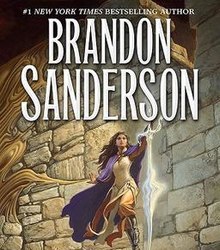
So, overall probably the most even of the series so far, I’d say? Not to say I didn’t like it – I really, really loved the finale, and there were plenty of great lines, but my god were there a lot of pages spent on nothing happening (honestly it kind of reminded me of the latter volumes of ASOIF, in that sense) – then again, I suppose that is kind of just the nature of these 1000+ page fantasy epics. There were some setting reveals that really were fascinating, and legitimately a bit surprising. Going to have to take a break from the series until the friend I got Rhythm of War for is done so I can borrow it, though I suppose that’s no huge loss compared to the however many years everyone else had to wait in between them.
So in terms of pacing it’s...bad. Or, well, that’s probably a bit unfair. There’s absolutely plenty of fat to cute, but again I do think that might just come with the territory of committing to like a dozen POVs across a tree’s worth of paper (though there were absolutely like 100+ page stretches where I’m not actually sure the plot meaningfully progressed). That said, honestly the main pacing issue isn’t so much the bloat as, like – okay, Dalinar’s arc was a pretty consistent throughline, but for Kalidan and Shallan it kind of felt like there was one whole story in Urithiru, and then from the mission to Kholinar and the journey through the Cognitive Realm felt like its own separate novel? I mean, not sure if that makes any sense, but it really did kind of feel like there was a whole additional first act of table and stakes setting once they arrived in the city.
Though, to argue in favor of bloat for a moment – I was chatting with @lifeattomsdiner bit back about The City We Became, and they mentioned that the size of the cast meant that you don’t actually really get to know any of the protagonists that well on their own. And I suppose that is the advantage of the 1200-page-per-volume epic cycle – even with characters you only really meet in interludes like Szeth, Vargo and Venli (incidentally three of my favorites), you spend enough pages inside of their head that you do really get to see what makes them tick and learn to love/hate them. Speaking of – props to Sanderson as an author, really – it’s vaguely astounding that he manages to keep track of that many internal monologues and actually make them seem distinct from each other.
Breaking things down by character a bit more – this book really did actually enjoy/get invested in Dalinar way more than either of the previous two, which again I’m told is more or less the expected reaction. Given the amount of tumblr brain poison I’m voluntarily exposed myself to, it’s honestly more than a bit of a nice change to see a character on a redemption arc who is actually unambiguously in need of redemption. Because holy shit, pulled, like, exactly two punches in terms of making the guy as genuinely loathsome as possible before he starts breaking. And, well, obviously he was on a redemption arc, but there was a bit near the end there where I really did think that the book was going to cut to black on an ‘end of Act 2, maximum darkness before dawn’ moment with, like, all the Skybreakers and him kneeling before Odium as the city fell. But I suppose that would be a bit much of a cliffhanger for a series with installments this weighty.
This was pretty clearly Shallan’s ‘getting over my personal bullshit’ book, like WoR was for Kaladin and WoK was for Dalinar, though spicing things up with increasingly severe DID as the book went on did make things more interesting at least. Also, I have no idea if this is actually true, but according to the friend who pestered me into reading these when someone asked Sanderson if he’d intentionally written her as bi he just kind of shrugged and said ‘sure, why not,’ which is fun. It was more than a bit, I don’t know, forced?, to have Wit just wander in from stage left and give her a desperately needed therapy session while she was in the middle of a breakdown and propel her development for most of the rest of the book, but on the other hand she’s pretty easily the main POV I’m most invested in by now, and the live triangle the text repeatedly threatened me with never actually became a thing, so I can’t really complain too much. Honestly super curious about the Ghostbloods and what they want out of her given, well, for a shadowy murderous conspiracy, everything they’ve wanted out of her so far has been pretty much entirely benign. Like, of the three major shadowy murderous conspiracies they’re easily the least problematic for the future of humanity at the moment. She should just commit and join for real imo.
As always, Kaladin’s POV is mostly good because it means we get more Syl, who is the single best character in the entire story I’ve decided. But also, I really quite liked his whole sojourn with the newly freed Parshmen and dawning realization that ‘wait these people are basically entirely right’. Also, the delicious delicious angst of spending however many dozens of pages getting to know them and then the wall guard and then the two groups killing each other in a confused melee while he has a mental breakdown. Easily best moment in the book (but then I’m a miserable person).
Adolin is honestly significantly more entertaining to follow than I really expected, though I’m still not like especially invested in him as a character. His relationship with his tailor was quite charming, though, as was the fact that he cares enough about fashion that he learned to sew. Honestly I was rather expecting/slightly dreading his main arc this book to be, like, inadequacy or insecurity over being almost literally the only member of his family that’s not a Radiant, so it’s kind of a pleasant surprise that he seems to have just accepted that (too well-adjust, I guess?). It is however extremely funny that the fact he just straight-up murdered one of the kingdom’s most important aristocrats and the major antagonist of the first two books seems to have resulted in absolutely zero consequences of any kind for him.
In terms of minor characters, the one I’m most invested in by a pretty substantial margin at this point is Venli, as she’s getting a front row seat to all the most interesting bits of the setting, ‘cultist growing increasingly disillusioned about return of ancient and terrible eldritch god’ is a really entertaining character arc just in principle, and because as of the end of the book she represents the morally objectively correct perspective and political line I’ve decided and will fight people about. Curious what sort of superpowers she’ll get. (Vargo and Szeth are still both great though, too).
The Unmade are really fun as a worldbuilding conceit/excuse for weird fucked up monsters. And it really is kind of funny that at least a third of the God of Evil’s nine generals/children/favoured beasts are, like, at conflicted or ambivalent about the whole ‘exterminate humanity and remake the world as a monument to my glory’ thing.
Really, on an extremely shallow and entirely aesthetic level, between the evil red crystal/lightning aesthetic, the remote mountain fortress as a stronghold of the heroes in the face of the coming apocalypse, tears into the realm of spirits, the quirky evil minibosses each handling corrupting/conquering a given center of civilization, etc, the whole thing kind of reminded me of Dragon Age Inquisition. Which reminded me of how disappointing the story to that game was, which made me like the book more by comparison, but anyway. Yeah, good book.
31 notes
·
View notes
Text
Final Fantasy XIII Review
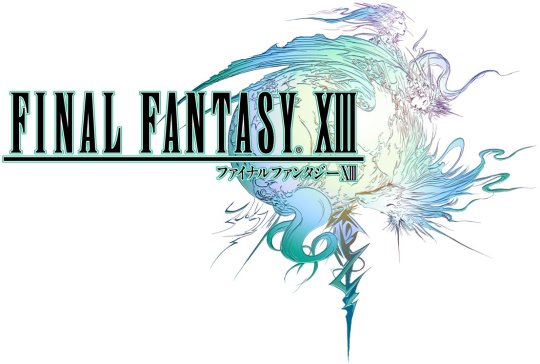
Year: 2009
Original Platform: PlayStation 3
Also available on: Xbox 360, PC, Android, iOS
Version I Played: PlayStation 3
Synopsis:
On the planet Cocoon, those who come into contact with anything from the planet Pulse are purged to that planet. Pulse is a feared planet full of monsters and strange creatures. Both planets are ruled by fal’Cie, mechanical godlike beings who sometimes brand humans as their servants for specific tasks, called a focus. Those who fulfill their focus are turned into crystals and obtain eternal life. Those who do not fulfill their focus turn into mindless monsters. Lightning is a former soldier whose sister, Serah, is branded by a fal’Cie and taken to be purged. Lightning sets off to rescue her.
Gameplay:
Going to say this now – the worst gameplay in the entire Final Fantasy series.
The battles are Active Time Battles but instead of you inputting individual commands, there are what’s called paradigms. Paradigms are somewhat like Job Classes from the old Final Fantasy games, except less fun and more automated. You can switch to a Medic paradigm in battle and every time you press “Auto-Battle” your character automatically performs a series of necessary cure and restore spells, based on what’s going on in the battle. The Sentinel paradigm specializes in keeping the enemy at bay. The Ravager paradigm uses magic. The Commando paradigm uses physical attacks. You get the picture.
As a result, the gameplay could be best described as:
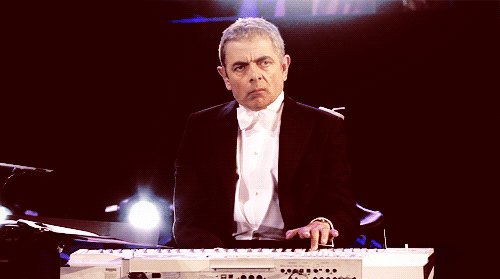
With occasional switching of paradigms whenever you see fit. You can set up a number of combinations across the characters. Two Commandos and one Sentinel. One Sentinel and one Ravager and One Commando, etc.
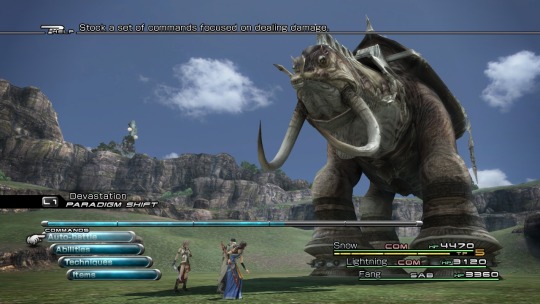

The party automatically heals after each battle – you can even press start during a battle and restart the battle.
I probably only used an item once or twice. I honestly don’t see why they bothered putting any items if you hardly ever use them.
You can upgrade your weapons with pieces and junk you find after battles. You find so many of them that you hardly ever think about what you’re upgrading so long as whatever you make upgrades your stats. Is this better? No? What about this? Okay, good. Moving on.
Like Final Fantasy X, the game is linear. Much more linear. You follow a long hallway for about 30 hours of the game before you can do sidequests. The sidequests involve completing other people’s focus. That’s about it. There are no towns, no inns, no villages. You are entirely on the road, constantly in battle (Okay, there’s like one time where Sazh and Vanille are in a casino or something but that’s about it).
I wrote a blog piece a while back about what exactly was wrong with Final Fantasy XIII, and it’s not that it’s linear. We play really great linear games all the time. It’s the automation – the feeling that you’re not really doing anything.
There isn’t an ounce of customization. Leveling up is similar to the Sphere Grid of Final Fantasy X. It’s called the Crystarium but it follows a strict path. You can’t actually stray anywhere or customize anything. If that’s the case, why bother making you open the menu to level up through the Crystarium? Why not just automatically do it? I guess they want to give you some ounce (more like a milligram) of control over the game.
Basically – you’re watching a long movie and occasionally get to move the people around. That’s how I see it.
Graphics:
PLAYSTATION 3 HD GRAPHICS HOMG DO YOU HAVEA BONER YET? LOOK AT THIS. FIRST FINAL FANTASY GAME IN GLORIOUS HD.

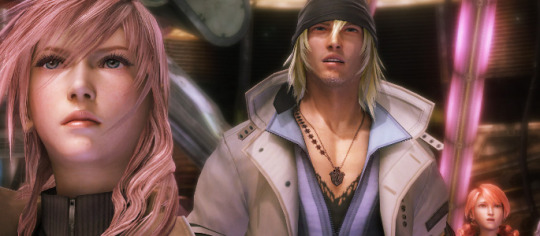
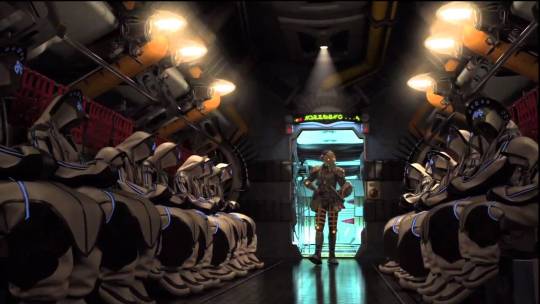
Everything is pretty in this game. Everything. There is nothing wrong with this at all.
Story:
The characters appear to reference those in Final Fantasy VII. Director Motomu Toriyama wanted Lightning to essentially be a female Cloud Strife. She’s a no-nonsense, athletic female lead. While Cloud and Squall were introspective and antisocial, Lightning is slightly different by actively ordering people around. She comes off as a dick to everyone, and that’s due to her ex-soldier background. Think of your stereotypical ex-cop/ex-CIA/ex-military action movie hero, like Liam Neeson (Bryan Mills in Taken) or Bruce Willis (John McClane in Die Hard). That’s basically Lightning.
Can we go on a short tangent for a moment to talk about how weird it is that Lightning was also used as a model for advertising in Japan?
Here she is driving a Nissan.

And wearing Louis Vitton.
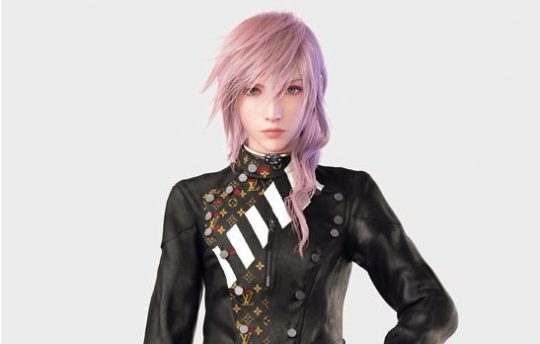
Cool? I guess? Unless you start to realize that Toriyama wanted to design his own personal waifu, and that he’s completely obsessed with her. That gets really weird. And sad? A little? Anyway.
Vanille has some reminiscent of Yuffie from Final Fantasy VII, although with more character via her inner monologues and narration. Fang is vaguely like Vincent Valentine. Sazh takes the place of Barrett as the token black dude, except instead of being aggressive he’s more like the comic relief and wants nothing to do with anything. Every time you control him, jazz music plays, because black people I guess. Hope doesn’t appear to be reminiscent of anyone – he’s just this boy who yells and complains a lot with Lightning. Snow meanwhile is a ripoff of Zell from Final Fantasy VIII, except somehow even more annoying.
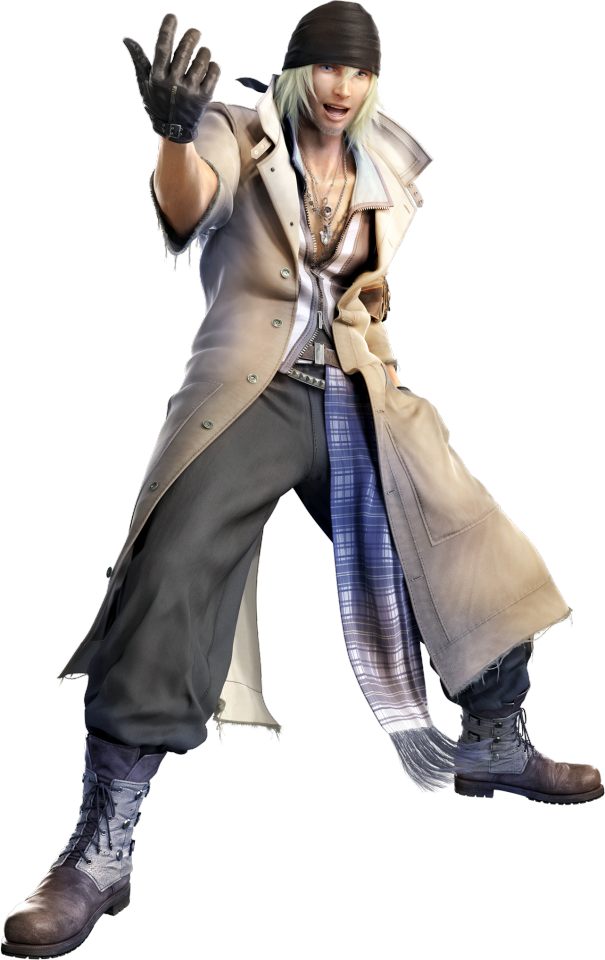
(Every time I see his picture I think about your typical dude bro at a frat.)
The story starts of a bit choppy as you follow almost each character separately, then they run into each other, then separate again, then join again. The first 30 hours or so gives flashbacks of 13 days prior- BECAUSE IT’S FINAL FANTASY XIII GET IT? Vanille actually narrates some events but it’s not exactly clear why or from when – but that’s a spoiler. Along the way, I got really confused because I didn’t know why some people were fighting each other when they were on the same side a moment ago. The concept of the “focus” is really weird and sometimes confusing. People with a focus simply have visions or a general idea of what they’re supposed to do, but they don’t actually know for sure unless they actively seek it. If the gods granted them a focus, wouldn’t it make more sense if the gods just told them what to do? Seemed to work in Final Fantasy XII.
In short, the narrative weaves around a lot. If you stop playing in the middle and pick up the game again months later, you’re bound to forget what’s going on. I know I did.
The characters didn’t annoy me as much as you would think they would on paper. They all have character development and that’s good. The only character that effectively got on my nerves was Snow. Snow is Serah’s fiancé, and Lightning hates him because of course you need some family drama. I don’t blame Lightning though. Snow shouts cheesy lines left and right, like “Heroes never die!”. He shouts Serah’s name the same way Christian Bale shouts Rachel’s name in the Christopher Nolan Batman films. Snow is quite possibly the most irritating character of all the Final Fantasy games. He will not shut the fuck up about what it means to be a hero.
The rest of the cast works well in that their motives and desires clash with each other. But I’m still sore about the wasted potential for a great character in Jihl Nabaat. Sazh wants his son Dejh back, who was taken to be purged by the sinister and extremely hot Jihl Nabaat.
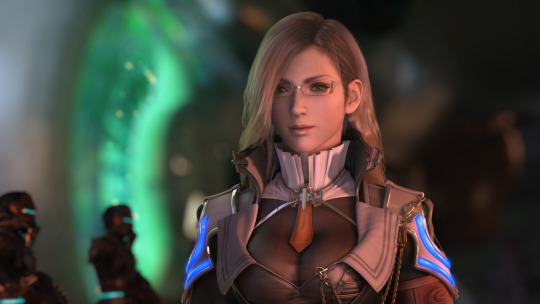
Goddaaayyyum. Seriously, look at her.
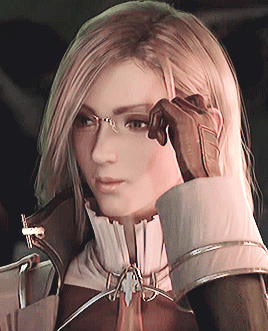
Too bad, because she’s only featured in a handful of scenes and then dies. Her death isn’t a major spoiler, at least one that I consider, because she hardly does anything except get in the way for a moment. You don’t even fight her. How lame is that?
Then you have this annoying bastard – Primarch Dysley.
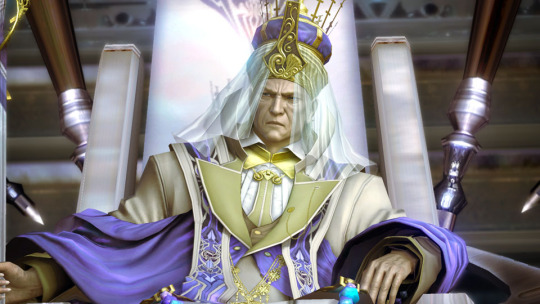
When I think of him, I think of Mitch McConnell.
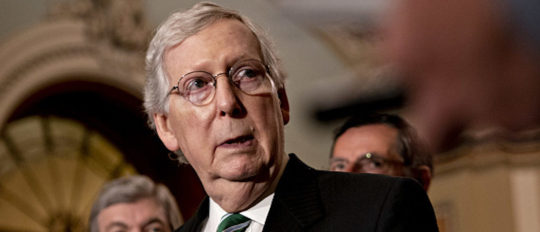
Old. Disagreeable. Been in power for too long. Always in the way of progress.
Primarch Dysley happens to be as annoying as Seymour from Final Fantasy X, so expect to be overjoyed every time you run into him.
Overall, the story isn’t as bad as you’d think. You just have to pay close attention. The gameplay is far worse than the story. I could easily slip into a coma while playing this game and still make it pretty far.
Music:
Final Fantasy XII saw the departure of Nobuo Uematsu (well with the exception of the pop song “Kiss Me Goodbye”). Final Fantasy XIII continues to head into the unknown without the beloved longtime composer. This game’s score is composed entirely by Masashi Hamauzu, who if you haven’t been paying attention, already partly worked on Final Fantasy X. I immediately saw how “Saber’s Edge”, the boss theme, is similar in nature to the boss theme of Final Fantasy X.
Final Fantasy XIII made the most radical changes to the score. There are no signature themes from the series. No “Prelude” theme, no “Main Theme”, no “Victory Fanfare” theme. Instead, we get a theme called “Fabula Nova Crystallis”. It plays frequently throughout the game, and almost acts as Serah and Snow’s love theme. In some portions of the game, some woman is singing along. Yes – this is the first time where you roam around a world in a Final Fantasy game with actual pop music playing in the background – “Sunleth Waterscape” to be exact. Final Fantasy XIII’s music gets pretty poppy.
youtube
Not saying it’s a bad idea.
Just.
You got pop music playing in the background now.
“Lightning’s Theme” is pretty sick. Her theme plays during the battles in a rendition called “Blinded by Light” – HA GET IT BECAUSE SHE’S LIGHTNING. SO CLEVER.
But Hamauzu was a good choice – the entire score holds up well and sounds like a movie score, with varying motifs running across. It can be a bit more subdued but that’s how contemporary instrumental music is nowadays, especially with film composers like Hans Zimmer.
Notable Theme:
“Blinded by Light”
Really epic, unique song. I always scat along to it as it plays.
youtube
Verdict:
Uff.
Look, if you just search on YouTube for all the cutscenes, there you go. That’s the game. And it’s entertaining to watch. But it has the worst gameplay that doesn’t feel like you’re even doing anything. No sense of customization or originality.
Direct Sequel?
Yes, two.
Final Fantasy XIII-2.
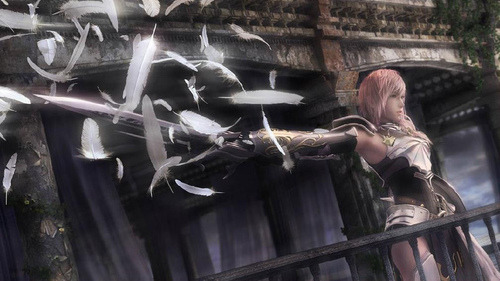
I started it around the time it first came out, but I’m still in the middle of playing it and I have no idea what’s going on in the story. NO idea. NONE at all. They use time travel but none of it makes sense. Apparently changing things in the future can change the past. I don’t know how. I only understand a vague semblance of a plot with the bad guy Caius. While it doesn’t tarnish the dignity of the original like Final Fantasy X-2 did, it’s still offbeat with its metal (yes, metal) music and utterly confounding story. It’s infamous for this metal rendition of the sweet and innocent Chocobo theme.
Then there’s the third game, Lightning Returns: Final Fantasy XIII
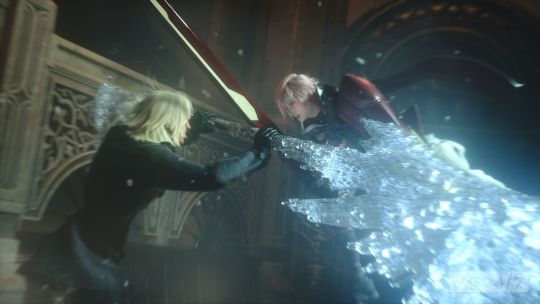
I plan on playing it after I finish Final Fantasy XIII-2, if I don’t already die from an aneurysm by then. It’s supposed to be better than Final Fantasy XIII-2 but lacking in graphics.
#final fantasy#final fantasy xiii#final fantasy xiii-2#lightning returns#lightning#final fantasy lightning#cloud strife#cloud clone#vanille#jihl nabaat#mitch mcconnell#video games#rpg#video game rpg#fantasy rpg#onvideogames
23 notes
·
View notes